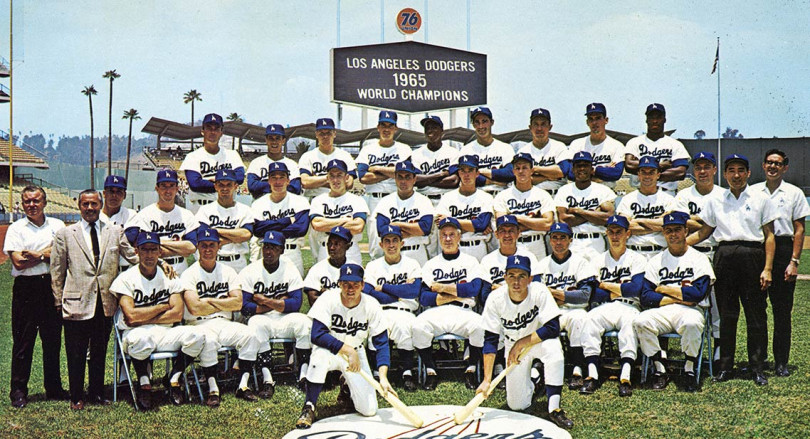
Feature
The 1965 Pennant Race
By Robert Schweppe
Introduction
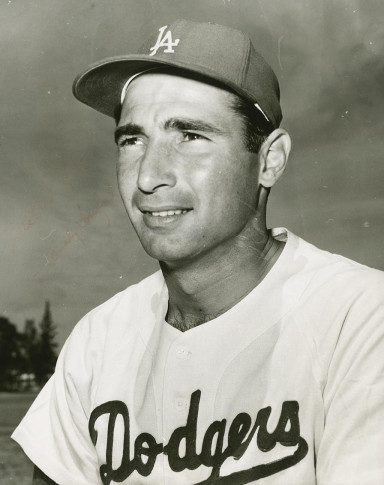
Sandy Koufax is one of the all-time great baseball and Dodger heroes. The left-handed pitcher threw four no-hitters in four consecutive years (1962-1965), including a 1965 perfect game against the Chicago Cubs at Dodger Stadium. He was inducted as the youngest player ever into Baseball’s Hall of Fame in 1972 at 36. Koufax had a 165-87 record and was a four-time Dodger World Series champion (1955, 1959, 1963, 1966) and two-time World Series MVP (1963 and 1965). He won the National League Cy Young Award three times (1963, 1965, 1966) when it was awarded only to one pitcher.
Sandy Koufax stood on the Dodger Stadium pitching mound and watched a fly ball hit to left field by Denis Menke of the Milwaukee Braves. It was a high fly ball to left field, but “playable”, meaning it would not be a home run and would be caught by the outfielder. Still, Koufax, the entire Dodger organization, 41,000 fans in the stadium and millions others listening on radio held their breath.
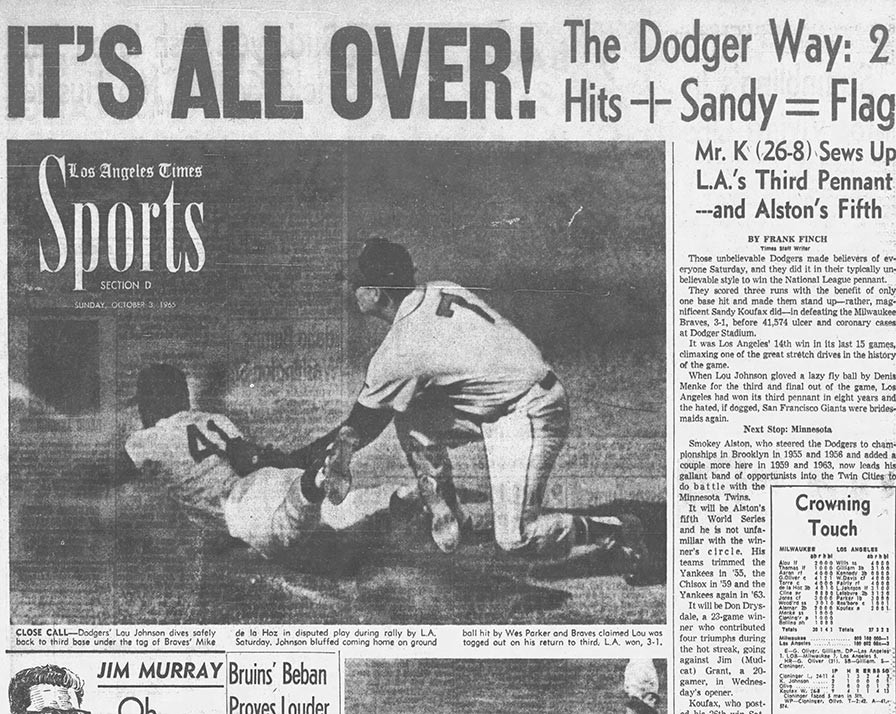
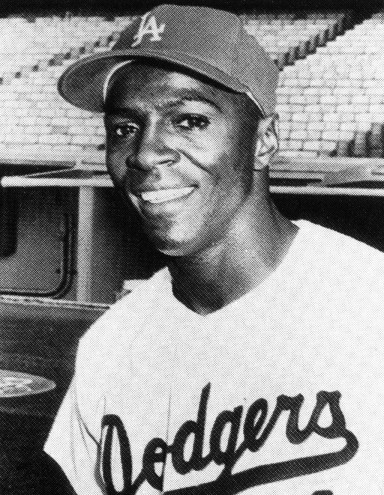
Dodger outfielder Lou Johnson, 1965-1967. He was a hero of the 1965 World Championship team when he tied for the team lead in home run. He would hit a solo home run in Game 7 for the Dodgers’ first run in their 2-0 win to clinch the World Championship. Johnson later joined the Dodgers’ Community Relations Staff in 1980 to work with players on drug and alcohol issues.
Dodger left fielder Lou Johnson waved his arms quickly at his side, the international signal of outfielders everywhere that he had it, he would catch it, and everybody else stay away, even though there was no one within 150 feet of him. A heartbeat later, Johnson made the catch, Koufax leapt off the mound and Johnson leapt into the arms of center fielder Willie Davis and it prompted a celebration as great as any there has ever been in Dodger Stadium. The fly ball caught by the outfielder was the 27th out of the 161st game of the 1965 season and sealed the Dodgers’ 3-1 win over the Milwaukee Braves. Even more, the victory meant the Dodgers were now two games ahead of the Giants with just one game to play and the 1965 National League pennant race, the crazy, wild, bumpy, careening, frantic, roller coaster pennant race, had reached its end. The 1965 Los Angeles Dodgers, the team that could not hit, could really pitch but played its best in its toughest games, despite the tremendous odds against them, had won the 1965 National League Pennant.
This team made up of players known as Gomer (Claude Osteen), Koofoo (Sandy Koufax), Big D (Don Drysdale), Gabby (John Roseboro), Mouse (Maury Wills), Three Dog (Willie Davis), Ducky (Don LeJohn), Trixie (Dick Tracewski), Devil (Jim Gilliam), Pod (Johnny Podres), Frenchy (Jim Lefebvre), Bull (Al Ferrara), Sweet Lou (Lou Johnson) and other Dodger players put on the greatest stretch drive in Dodger history to win the National League pennant and overcame a great September effort by their arch nemesis, the San Francisco Giants.
When did this pennant race begin? For the Dodgers, coming off their dismal 1964 season of 80 wins against 82 losses, the 1965 season started the day after the 1964 season ended. The 1963 World Champion team had been humbled by the loss of starting pitching during the 1964 season as Sandy Koufax and Johnny Podres both went on the disabled list. After the loss of those starting pitchers, obtaining pitching became the team’s priority during the winter.
The Off Season
General Manager Buzzie Bavasi would make bold moves to return the team to contention. On December 4, 1964, the Dodgers and the Washington Senators made a block-buster seven player trade. The Senators received outfielder Frank Howard, one of the top power hitters in baseball and four other players. In return, the Dodgers acquired left hand pitcher Claude Osteen and infielder John Kennedy. Howard was a definite long ball threat, but the Dodgers felt their needs were to improve the starting rotation. Ron Fairly, Willie Davis, Tommy Davis, Wes Parker and Al Ferrara remained to provide offensive support and depth at the outfield position allowing them to make the big trade.
The Dodgers needed Osteen as a quality starting pitcher if Koufax and Podres were not ready to open the season. Going into spring training in 1965, the two southpaws were both healthy and Osteen was a valuable supplement to the staff. Osteen’s greatest strength as a left hander was that he could get hitters to hit the ball on the ground, an effective quality in pitcher-friendly Dodger Stadium. In addition, Osteen could handle the bat as a pitcher.
The 1965 Dodger team had a good mix of youth and experience. John Roseboro remained one of the game’s best catchers, smooth fielding Wes Parker was at first base, rookie Jim Lefebvre surprised everyone by having a great spring and would start at second base, Maury Wills continued to play well at shortstop and John Kennedy was expected to play third. The outfield was solid with Tommy Davis in left field, Willie Davis in center field, and Ron Fairly in right field. The starting rotation was formidable with Koufax and Drysdale, the addition of Osteen and a healthy Johnny Podres. The bullpen looked strong with Ron Perranoski as the closer and Jim Brewer and Bob Miller adding plenty of depth and experience.
April - May
In the opening month of the 1965 season, the Dodgers started well. On April 30, they defeated the Giants to win their 10th game in 15 starts. Koufax, Drysdale, and Osteen pitched well and Podres was showing previous form. Wills was ahead of his record pace of stealing 104 bases in 1962. Rookie second baseman Lefebvre made contributions and consummate pro Fairly was driving in timely runs. Outfielder Tommy Davis was off to a slow start, but was starting to feel comfortable at the plate. The club looked to have no problem scoring runs. And then, in an instant, the offense changed for the worse.
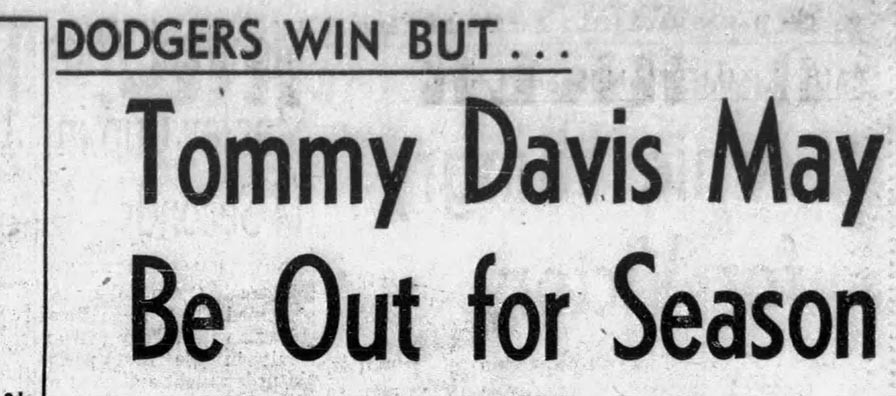
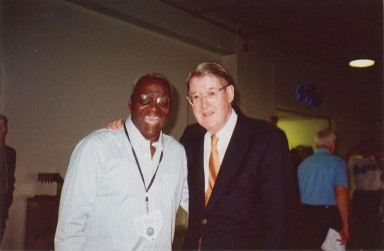
(L-R) Lou Johnson; Peter O’Malley at Dodger Stadium, October 2009. Lou Johnson is a longtime member of the Dodger front office in player development and community relations. Johnson’s 4th inning home run in Game 7 of the 1965 World Series was the Dodgers’ first run in their 2-0 win over the Minnesota Twins to clinch the 1965 World Championship.
The night of May 1st had the Dodgers playing the Giants in front of a large crowd in Dodger Stadium. In the fourth inning, Tommy Davis singled. A grounder was hit to Giant pitcher Gaylord Perry. The Giant pitcher threw to first to retire the hitter but as Davis hustled down to second to avoid a force play, he slid, catching his spikes and severely injured his ankle. As Davis said later, “It felt like my ankle went into right field. Frank Finch, Los Angeles Times, May 2, 1965 The capacity crowd went silent as Davis, in obvious discomfort, was removed from the field on a stretcher. Dodger players and fans knew the loss of Davis would be significant. Without him, the Dodger offense would be sorely tested. Frank Finch, beat writer for the Los Angeles Times said, “(Tommy) Davis was removed to Daniel Freeman Memorial Hospital and the Dodgers were removed from the board in Las Vegas as pennant favorites.” Frank Finch, Los Angeles Times, May 2, 1965
Even though the Dodgers won the game that night with three runs in the eighth inning, the club morale was very down on the loss of the hard hitting outfielder. Koufax wrote in his autobiography, “It was a somber mood in the clubhouse.” Koufax by Sandy Koufax with Ed Linn
The Dodgers ended their homestand and traveled to Cincinnati without their regular left fielder and waited to see who would be Tommy Davis’ replacement. General Manager Bavasi called Spokane, Washington where Peter O’Malley, the future President and Chairman of the Board of the Dodgers, was the current president of the Spokane Indians and told O’Malley the Dodgers wanted to promote outfielder Lou Johnson. O’Malley then called Johnson, also known as “Sweet Lou”. O’Malley thought he had good news for Johnson and informed him he was to report to Cincinnati. “Sweet Lou” didn’t feel so sweet then, because he mis-interpreted the remarks from O’Malley. Johnson mistakenly thought he had been traded to the Cincinnati organization and he knew a team with an outfield of great offensive players as Tommy Harper, Vada Pinson, and Frank Robinson, would give him little chance to play in the major leagues. Johnson told O’Malley he would refuse to report. “Koufax: A Lefty’s Legacy” by Jane Leavy “I thought he was just kidding around,” The Sporting News, October 16, 1965 said Johnson. O’Malley clarified his comment. Johnson was reporting TO the Los Angeles Dodgers IN Cincinnati. That was very different and Lou Johnson reported to Cincinnati, now a very happy big league player again.
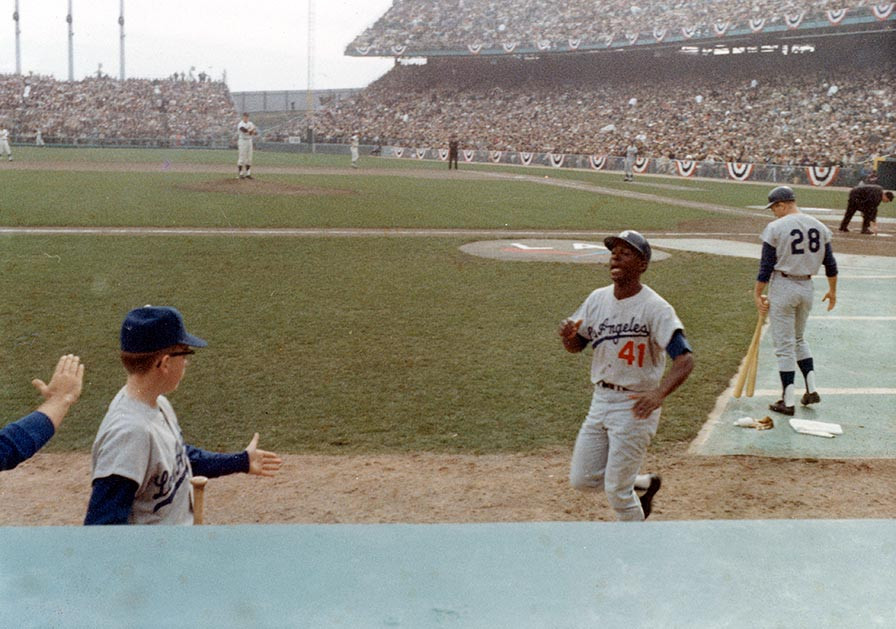
Dodger outfielder “Sweet” Lou Johnson beams proudly as he returns to the Dodger dugout after his fourth inning home run off the left field foul pole in Game 7 of the 1965 World Series gave the Dodgers a 1-0 lead. His home run would be all the runs needed as Sandy Koufax shuts out the Minnesota Twins 2-0 and the Dodgers win the 1965 World Championship.
Johnson was a veteran outfielder who had played at previous times in the major leagues with the Angels, Braves and Cubs, but had never been able to stay there for long. In April, 1964, the Dodgers had traded pitcher Larry Sherry to the Tigers and in return, had received Johnson. Johnson spent the entire 1964 season at Spokane but was never promoted to the major league team. He was not even invited to the 1965 spring training major league camp as a non-roster player. Now Johnson had his opportunity. How important did Sweet Lou become to the 1965 Dodger club? Five months later in the victorious Dodger clubhouse on the day the club clinched the National League pennant, Sandy Koufax said it best, “Johnson’s the guy. If it hadn’t been for the job he did, we might not be here today”. The Sporting News, October 16, 1965
Johnson’s first game as a Dodger was in a modest role, playing the 9th inning in place of left fielder Al Ferrara as Koufax defeated the Reds, 4-2. His expected role was to play late inning defense, pinch-hit against left handers, pinch-run, be the extra outfielder and make the occasional start.
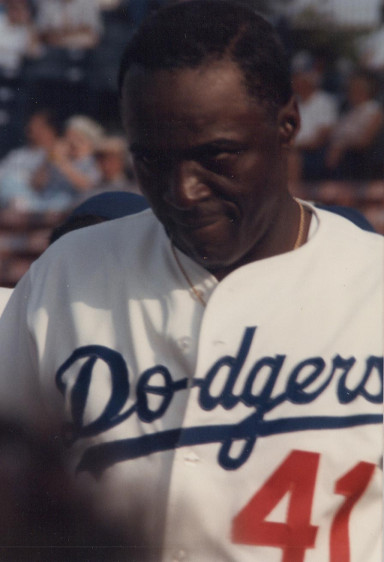
Lou Johnson was the Dodger sparkplug that carried the Dodgers to their 1965 World Championship title. Recalled from Spokane in the Pacific Coast League in May, Johnson did not waste time in making an impression. On May 10, 1965, making his first start in Dodger Stadium, “Sweet Lou” stole second base and scored the winning run in the 10th inning on a base hit. He provided power to a team that lacked power and his 12 home runs tied him for the club lead. On September 28, 1965, his 12th inning home run at midnight, his fourth hit of the game, gave the Dodgers a 2-1 win over the Cincinnati Reds and moved them into first place where they remained the rest of the way to win the National League pennant. Johnson had the only hit and scored the only run in Sandy Koufax’s 1965 perfect game. Fittingly, he caught the final out that clinched the 1965 National League pennant. He hit two home runs in the 1965 World Series for the Dodgers, including a solo home run off the left field foul pole in the fourth inning to give Sandy Koufax all the runs he needed in his Game 7 shutout for the Dodgers’ World Championship.
On May 10th, the Dodgers started a homestand against the Astros, but Ferrara, the man who replaced Tommy Davis had to be replaced himself in the lineup because of a broken finger. And role player Lou Johnson suddenly got a leading role. Walter Alston showed great confidence in Johnson and hit him fourth in the lineup. Johnson did little in the first nine innings and the two teams were tied, 2-2 in the 10th inning. With two out, the legend of Lou Johnson began. He singled, stole second, went to third on an overthrow and then scored the winning run when Fairly singled. And that was just the start. The next night, Johnson pinch-hit and singled and the Dodgers won. On May 13, 1965, Johnson was back in the starting lineup. He hit a solo home run in the second inning to give Sandy Koufax the lead, but it was in the fifth inning where everyone got a scare.
Bob Bruce, a hard throwing right hander for Houston, struck Johnson in the middle of the forehead with a pitch. Fortunately, for Johnson, he was wearing a strong protective helmet as the pitch virtually shattered the helmet. The helmet was later reviewed in the press box. It was described as having “a dent as big as a baseball.” Frank Finch, Los Angeles Times, May 14, 1965 The Sporting News ran a photo of the broken helmet in their May 29th edition. Bob Hunter wrote in The Sporting News, “It (the baseball) struck him squarely between the eyes, but on the helmet, where it broke through the fiber shell, the imprint of the seams of the baseball could be clearly seen. Team doctor Robert Woods said, “Had it not been for the protective fiber helmet, he (Johnson) would have been killed. The Sporting News, Bob Hunter, May 29, 1965 Johnson went into the hospital for three days for observation, but when pronounced fit to play, he was back in the lineup.

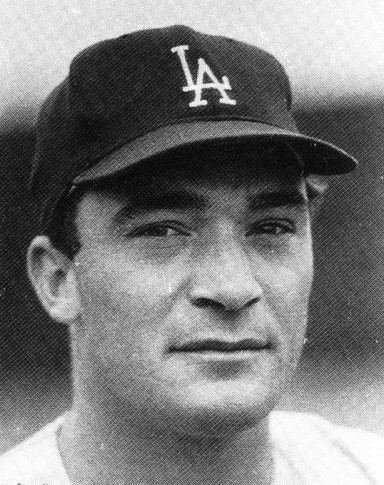
Al “The Bull” Ferrara, 1963-1968
Without Tommy Davis and now Johnson, the Dodgers’ offense learned to do a lot with a little. On May 15th, the Chicago Cubs’ Dick Ellsworth was leading 1-0 in the eighth inning and had not yet allowed a hit to the Dodgers. Ferrara was called on to hit by Alston, and despite a recent recovery from a broken finger, hit a three-run home run to win the game. “I was going to use Drysdale,” said Alston. The Sporting News, Bob Hunter, May 29, 1965 “Before the game, Ferrara told me he wanted to play, but the doctor said it would be taking a chance and his recovery could be delayed by another 10 days. However, when you’re desperate, you’re not quite as merciful, so I forgot what the doctor said,” said Alston. It was only Ferrara’s second major league home run, but it came in the right time and the right place and the Dodgers won 3-1. Everyone on the club had to make a contribution. The next day, Don Drysdale was leading 2-1 in the ninth inning when the Cubs tied the game. Not a problem. With two outs in the bottom of the inning, Drysdale doubled to center off Cub reliever Lindy McDaniel. Two hitters later, Parker singled to center, and it was Drysdale who scored the winning run to give himself the win.
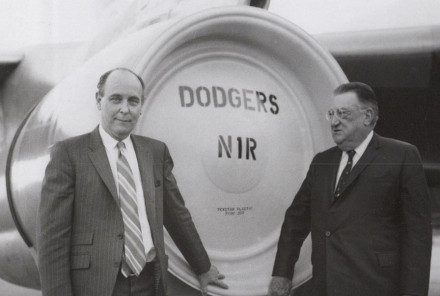
(L-R) Dodger pilot Lewis Carlisle; Walter O’Malley.
Dodger pilot Lewis Carlisle is with Dodger Chairman of the Board Walter O’Malley by the team’s 720-B jet with their exclusive FAA listing of N1R. The aircraft designation was rarely given out by the FAA, but signified it was the Dodger plane when in operation.
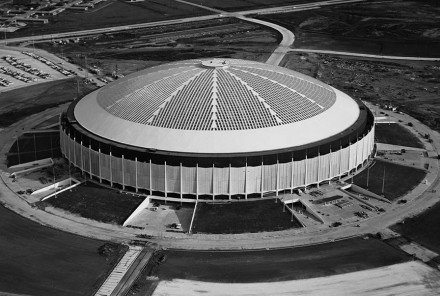
A view of the Astrodome in Houston, Texas. Walter O’Malley was a key member of the National League Expansion Committee who approved the expansion Astros on October 17, 1960 to begin play in 1962.
May 17th was an unusual game and not because it was the Dodgers’ first game ever played indoors in the Houston Astrodome. Lewis Carlisle made his pilot debut for the Dodgers by taking over the Dodger Electra controls. Frank Finch, Los Angeles Times, May 18, 1965 Fans in Los Angeles had a treat as the game was televised back to Los Angeles. In the early 1960’s, the Dodgers rarely televised games that did not originate in San Francisco. The Houston Astrodome had opened that season for the Astros, a domed stadium necessary for the heat and humidity in Houston. Baseball fans marveled at the sight of baseball being played inside a covered stadium with a Texas sized scoreboard and message board. Sandy Koufax said of the Astrodome, “I’ve never heard ballplayers talk about a park as they have about this one. I’m surprised they didn’t build a motel for the visiting teams right inside the park.” Frank Finch, Los Angeles Times, May 17, 1965
Koufax started and pitched into the 11th inning and earned a win when the Dodgers scored four runs in the 11th inning with Koufax hitting a single and scoring a run in the tie breaking inning. Bob Miller relieved Koufax to get the final two outs for the save. Two nights later, the Dodgers defeated the Astros, 4-2, but this time it took 14 innings. Ron Fairly’s fourth hit of the game was a two-run home run to be the decisive runs. Five Dodger relief pitchers shut out the Astros over the final 8 2/3 innings, but it was the last Dodger reliever that provided an unusual twist to the game. With a runner on first base and two outs in the 14th inning, Alston brought in Drysdale to face a tough hitter in Astro rookie Joe Morgan. Drysdale struck out Morgan for the final out, and starting pitcher Drysdale earned a save. The victory was also notable because it was the 1,000th win for Dodger Manager Walter Alston in his major league career. Frank Finch, Los Angeles Times, May 18, 1965
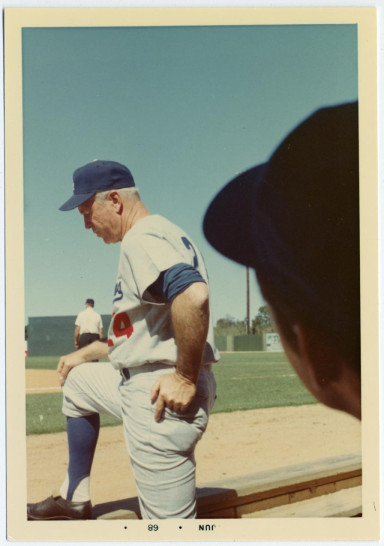
Dodger Manager Walter Alston (#24) on the steps of the dugout prior to a Spring Training game.
Things didn’t always bounce their way. On May 23rd in Chicago, the Dodgers scored two quick runs in the first inning, but saw the Cubs tie the game in the ninth inning. The two teams battled until the 16th inning when the Cubs pushed over a run to win, 3-2. Alston used a six-man infield successfully in the 12th inning when he brought in right fielder Ron Fairly to play first base as regular first baseman Wes Parker charged the bunt attempt. Frank Finch, Los Angeles Times, May 24, 1965 Every game was tight because of the strength of the Dodger pitching. And, every game was tight because the Dodgers did not have much offense.
A late night in May showed two great pitchers against each other. On May 25th, Drysdale started for the Dodgers against the vaunted Bob Gibson of the Cardinals. Curt Flood singled to open the game for the Cardinals, but was later stranded at third base to end the inning. Flood might as well have waited all night at third base for his Cardinal teammates as Drysdale did not allow another hit the rest of the night in the 2-0 shutout win. Only one other Cardinal hitter reached base, and that was by an error. Drysdale did not walk anyone and even singled and scored a run. How great were the two pitchers that night? They played a nine inning game in one hour, 41 minutes.
How many ways did the Dodgers need to score runs? On May 27th, the Dodgers scored the winning run in the ninth inning to defeat the Braves, 3-2 when Al Ferrara coaxed a one out walk from Brave pitcher Denny LeMaster. The Braves had eight hits, four of them doubles, but lost. The Dodgers had just six singles and no extra base hits, but Johnny Podres, still showing he had the touch, kept the Braves off balance and pitched a complete game win. Two nights later, Lou Johnson’s second home run of the game helped the Dodgers to a four-run eighth inning and they defeated the Braves, 5-3 as Drysdale pitched a complete game and struck out 12.
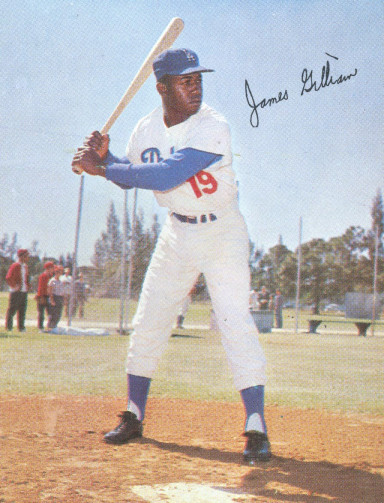
Jim Gilliam has played on the most number of Dodger World Championship teams (1955, 1959, 1963, and 1965) and it was his game-saving play in Game 7 of the 1965 World Series that helped the Dodgers to their fourth World Series win. In the fifth inning, with two Twins on base and one out, Gilliam backhanded a hard hit ball by Zoilo Versalles and ensured a force play at third base for the second out and the Twins would be held scoreless for the inning. Most baseball observers agreed it was the defensive play of the 1965 World Series. Jim Gilliam’s uniform No. 19 was retired by the Dodgers, the only one by a non-Baseball Hall of Famer.
A big moment for the club came on May 28th when Jim Gilliam was activated as a player from the coaching ranks. The popular Gilliam had been named as a Dodger coach late in the 1964 season as one of the first African-American coaches in major league history. The 1953 National League Rookie of the Year still had enough ability to play in the major leagues. He was expected to play in a utility role, but on May 31st, he played in 16 innings of 18 innings in a doubleheader. Gilliam had just one hit in his first 10 at bats, but regained his batting eye quickly. He hit safely in his next 11 of 13 game appearances with 20 hits in 48 at bats and gave the Dodgers a valuable lift. Alston said of Gilliam, “It’s his experience that makes him so valuable.” Los Angeles Times, May 29, 1965
The team had been healthy coming out of spring training, but injuries were popping up. May 30th added to the strangeness of the 1965 season. The Dodgers and Reds opened a three-game series on a Sunday with the teams playing a Memorial Day doubleheader the next day. The Dodgers broke a 2-1 game open in the third inning with six runs and with Koufax on the mound, they opened a 10-1 lead. In the fourth inning, a leg cramp suffered by Willie Davis led to the scariest moment of the game. Ferrara came into the game to play left field and Lou Johnson moved to center. The Reds had scored twice and with two men on base and two out, shortstop Leo Cardenas hit a line drive to left center. Left fielder Ferrara and center fielder Johnson both converged on the ball and collided hard, the ball falling free for a triple and two more runs scoring. Johnson was badly shaken up and remained in the game, but Ferrara was knocked out and removed from the game by stretcher. When Ferrara came to in the clubhouse, the competitor in him demanded, “Who took me out of the game?” It was Drysdale who told him, “It was six guys, on a stretcher.” The Sporting News, Bob Hunter, June 12, 1965
As the Dodgers moved to a three game lead over the Giants on May 31, someone told sportswriter Bob Hunter, “Now I see how they’re doing it. With a minor leaguer from Spokane (Lou Johnson), another who was ticketed there (Al Ferrara), a coach (Jim Gilliam), a rookie playing his first year (Jim Lefebvre), and a utilityman (John Kennedy).” The Sporting News, Bob Hunter, June 12, 1965
June
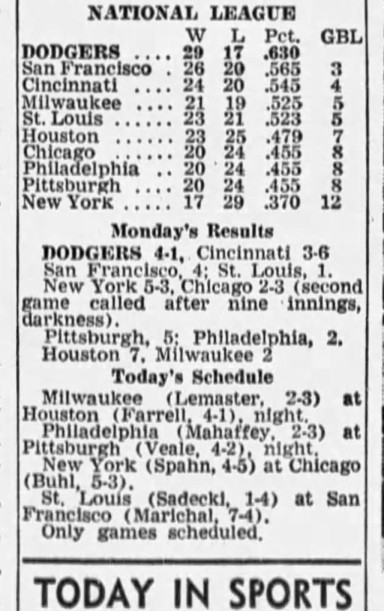
As the calendar turned into June, it was clear the National League would be a close pennant race that season. The Dodgers, Giants, Reds, Braves and Cardinals were separated by 5 1/2 games. The Dodgers, despite being in ninth place of 10 teams in runs scored in the National League had a four game lead in first place, but, of course, they also led the National League in fewest runs allowed.
Surprises during the 1965 season for the Dodgers continued. On June 3rd in St. Louis, the Dodgers defeated the Cardinals, 11-10 in a game that saw the Dodgers overcome deficits of 7-3 and 10-7. The club needed to score all the runs they could as Koufax departed the game after just two innings when he allowed seven runs, two of them earned. Fairly hit a two-run home run in the eighth inning to give the Dodgers the lead and the club had 15 hits in the game. Four nights later, the Dodgers had 16 hits in the game and scored 14 runs to defeat the Phillies. Even Koufax joined in the fun with two hits and two RBI.
Drysdale did it all for the Dodgers against the Mets in New York on June 11th. The big right hander pitched a complete game for his 11th win and hit his third home run of the season off 44-year-old Warren Spahn (who pitched a complete game) in the eighth inning as Don provided the winning run for the margin of victory. For the third time that season, Drysdale had driven in the winning run for the team. Even though Drysdale had his own model bat, he was having good success with a 33-ounce Willie Davis model. Frank Finch, Los Angeles Times, June 12, 1965
The long-time rivals from New York, the Giants and the Dodgers, intensified their rivalry upon their move to the West Coast. It had been the Dodgers who had won a close pennant race in 1959 and the Giants who took the honors in 1962. And, as two great rivals will do, it seemed that the two teams were always to be involved in a close pennant race and they were bound to end up playing each other in tight, close games. A three game series in Los Angeles had the Giants winning the first game, 2-1 behind the Giants’ great starting pitcher, Juan Marichal. The next night, it was Koufax besting Bob Shaw, 2-1. The rubber game of the series went to the Dodgers when Osteen blanked the Giants, 3-0. Osteen’s shutout was a one-hitter, the only hit coming in the second inning. The three games produced six runs for the Dodgers and just three runs for the Giants!
On June 20th, New York Met Manager Casey Stengel must have groaned when he read the newspapers and discovered that the Dodgers would start Sandy Koufax in the first game in a doubleheader and Don Drysdale would be the starter for the second game. This was the first time the great Dodger duo had ever started a doubleheader. However, after Koufax one-hit the Mets in the first game, the Mets defeated Drysdale and the Dodgers, 3-2 in the nightcap. To add insult to injury, the next night left hander Alvin Jackson shutout the Dodgers 1-0. The Dodgers won the final game, 4-2, but gained just a split with the lowly Mets.
The pitching would not always be so great. On the night of June 24th, it was amazing that Dodger Stadium was still standing after the Pittsburgh Pirates’ Wilver Stargell was finished. Stargell hit three home runs in Dodger Stadium, the first player to do so, and in the eighth inning, hit the left center field wall on the fly for a double, narrowly missing a four home run night. Stargell had four hits, 14 total bases and drove in six runs as Drysdale was chased from the game before the end of the fourth inning.
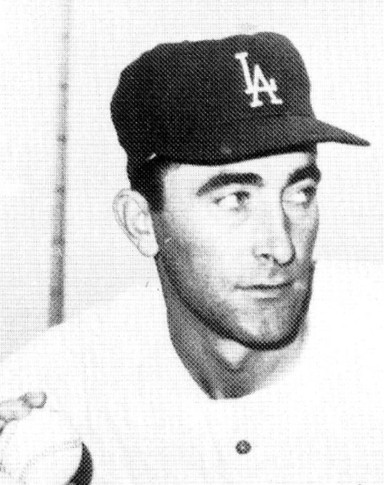
Dodger infielder Don “Ducky” LeJohn, 1965. LeJohn later became a Dodger minor league manager and won 1,243 games in his career.
On June 30th, the arrival of a new player with his own unique playing history joined the Dodger team. Don (Ducky) LeJohn signed originally with the Dodgers and played 12 seasons in the minor leagues before his call-up. Bob Hunter wrote in The Sporting News that LeJohn had never even seen a major league game until he reported to the team in Chicago. Bob Hunter, The Sporting News, July 17, 1965 LeJohn had been playing for the Dodgers’ AA club in Albuquerque in the Texas League but it was felt his background and experience would pay dividends for the club as a right hand pinch-hitter and utility infielder. He had also been serving as a player-coach and helping younger Dodger players at Albuquerque. LeJohn wasted little time making a contribution as he singled in his first major league at bat to drive home a run and then he scored what proved to be the decisive run in a 4-3 win over the Cubs. He hit safely in first five games and had six hits in his first 16 at bats.
July
Somehow, the team was staying afloat in first place, but injuries were taking a toll. The club was still ninth in the National League in runs scored. Cartoonist Karl Hubenthal had a feature in The Sporting News that showed First Lady Lady Bird Johnson holding a phone for President Lyndon Johnson saying “It’s long distance calling...someone in Los Angeles wants to know where he can apply for Medicare.” In the bottom right corner of the cartoon, Hubenthal had drawn a hapless Los Angeles Dodger player with injuries to his ankle, hamstring, knee, finger, elbow, back, shoulder, neck, thumb, and finally the headaches suffered by Manager Walter Alston. In addition to Tommy Davis’ ankle, Lou Johnson had broken a thumb, Wes Parker had a sore shoulder, John Roseboro suffered from back problems, Drysdale had a tender knee, Willie Davis pulled rib cartilage, Jim Brewer’s elbow, and most importantly, the chronic arthritic elbow of Koufax. Karl Hubenthal, The Sporting News, July 3, 1965
Despite the injuries, Alston was not letting his players feel sorry for themselves. Until June 25th, the club had not lost more than two straight games. However, a stretch that saw them lose eight of 11 games to put them into a tie for first place caught Alston’s attention. After a 7-4 loss in Cincinnati on July 5th where they lost two leads and made two errors, Alston closed the clubhouse doors and spoke to his players as only he could. Alston was aware of his outburst. The Reds that night had fireworks after the game and as the reporters were allowed in the clubhouse, Alston asked if the fireworks were over. “The ones outside, I mean.” The Sporting News, July 24, 1965 Coach Danny Ozark said, “We needed something like that to loosen us up.” The Sporting News, July 24, 1965 The team responded to Alston’s comments and won the next night, scoring 11 runs and went back into first place.
The game of July 7th had a new stratagem unleashed by Alston. With the Dodgers trailing the Reds in Cincinnati, 5-3, Willie Crawford was scheduled to pinch-hit for pitcher Howie Reed against a right hand pitcher. Dick Sisler, the Reds’ manager, countered with left hand pitcher Bill McCool to face the left hand hitting Crawford. In a bit of a surprise, Alston sent up pitcher Don Drysdale to hit for Crawford. But why not Drysdale? He was hitting .302 and more importantly, slugging .567 before the at bat. Alston’s best laid plans didn’t work out. Drysdale hit into a double play, ending the inning and the Dodgers lost, 7-6. Drysdale would be called on to pinch-hit several more times during the season and his presence created more roster flexibility for Alston.
At the All-Star break, the National League race was getting tighter. The Reds were in first place by three percentage points over the Dodgers. The Giants were three games behind, the Phillies 3 1/2 games out, and the Braves were 5 1/2 out. Believe it or not, the powerful San Francisco Giants had scored four fewer runs than the Dodgers, but at the same time, their pitching was nearly as good in runs allowed. Bob Hunter wrote in The Sporting News the New York Yankees were known for “Murderer’s Row” but the Dodgers were the “Banjo Boppers”. Hunter also wrote the Dodgers had their own “Murderer’s Row”, but it was in the ninth spot, reserved for pitchers. The Sporting News, 31, 1965 In the two games preceding the All-Star break and three games following the break, the trio of Sandy Koufax, Don Drysdale, and Claude Osteen had five hits in 13 at bats with three RBI. Needing every contribution they could find, the Dodgers won four of those five games.
It was not enough that Koufax had to pitch his way to wins, he also had to drive in runs. On July 20th, the Dodgers and Astros were tied 2-2 in the ninth inning. The Dodgers had runners on first and second with two out. With Koufax up and having already pitched nine innings, fans wondered if Alston might pinch-hit for Koufax. Koufax hit for Koufax, and he singled to left, scoring Lefebvre with the winning run and Koufax won his 17th game of the season against three defeats.
If you were going to beat the Dodgers, it was a good idea to make sure your best hitter did it. In consecutive games, it was Henry Aaron of the Milwaukee Braves who took apart Dodger pitching in the first inning. In a July 21st game, Aaron followed hits by Felipe Alou and Frank Bolling with a three-run home run off Osteen. And, just to make sure the Dodgers didn’t forget about Aaron, the next night, July 22nd, the great slugger did it again. The Dodgers’ Bob Miller allowed a leadoff single to Felipe Alou and a single by Mack Jones. Aaron came up and for the second straight night, hit a three-run home run to get the Braves on their way to a victory.
August
The Dodgers opened the month of August still in first place by a slim margin of 1 1/2 games over the Reds, 3 1/2 games over Milwaukee and four games over the Giants. The club was playing well, the pitching was still consistent, and interestingly enough, the club had scored enough runs to be seventh in the National League, one slot better than the Giants.
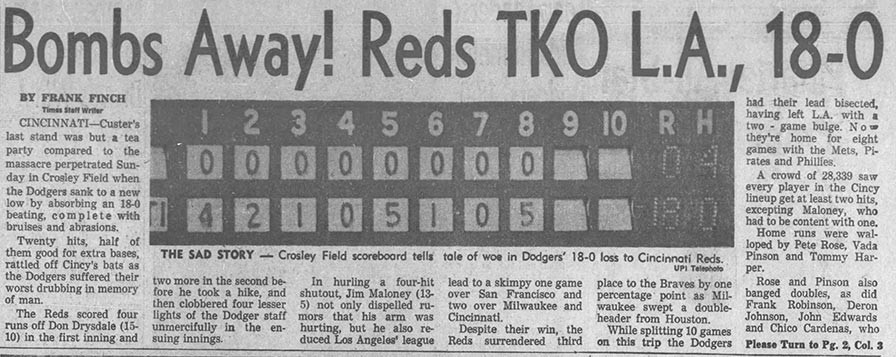
August brought a few shocks to the system. The Dodgers were in Cincinnati on August 8th and it looked to be a sensational pitching match-up with the Dodgers’ Drysdale against the Reds’ Jim Maloney. Maloney was regarded as one of the top pitchers in the National League. He threw a one-hit shutout in his first start of the season and on June 14th, he did not allow a hit in the first nine innings and struck out 18 Mets but was defeated on an 11th inning home run. Later in the month on August 19th, Maloney would throw a 10-inning no-hitter against the Cubs, but this Sunday he faced the Dodgers.
It was not even close. The Reds scored four runs in the first inning, two runs in the second, a run in the third inning and they just kept on going. When the dust finally settled in the ninth inning, the Reds had a 18-0 win over the Dodgers and Maloney cruised with a four-hit shutout. Were the Dodgers fazed by the 18-0 shellacking? They came home and showed their mettle and won the next four games, beating the Mets twice, 4-3 and 1-0, and the Pirates twice, 3-1 and 1-0. In the 1-0 game against the Pirates, Don Cardwell and Koufax had a pitchers’ duel with the game scoreless in the 10th inning. With two outs, Koufax walked and moved to second on a walk to Parker. Gilliam hit a ball to right field that was misplayed for an error and Koufax scored the winning run.
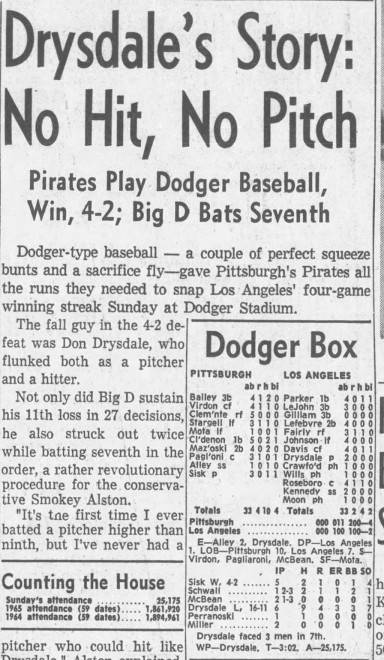
The Dodgers’ just did not have enough offense. And in this already very unusual season, Alston tried a very unusual lineup to help the offense in a game against Pittsburgh on August 15th, maybe one of the most unusual lineups ever devised by a Dodger manager. Maury Wills had been ailing with a sore leg, so Wes Parker led off and was followed by Don LeJohn. Jim Lefebvre hit third, Ron Fairly hit cleanup, Lou Johnson hit fifth, and center fielder Willie Davis hit sixth. The seventh hitter was a regular, but not a regular position player but he was hitting .295 and slugging .534 when he started the game, as the pitcher. Don Drysdale was put in the lineup at the seventh spot. John Roseboro batted eighth and John Kennedy hit ninth that day. It didn’t help. Drysdale went 0 for 2 with two strikeouts, the Dodgers had just four hits and lost 4-2.
The month of August is always a difficult one for baseball players. They refer to the latter two weeks of August as the “dog days” a term that refers to Sirius, known as the “dog star” that rises and sets with the sun. The star effect has no impact on the weather temperature, but the difficulty of playing major league baseball on an every day basis in an already long season with no relief in sight of the end shortens tempers. Add to that mix the civil disturbances in Los Angeles in August and a tight pennant race between the Giants and the Dodgers and a perfect storm was rapidly approaching.
And now perhaps the fiercest baseball rivalry of the era had the Dodgers and the Giants going head to head in four games in late August in San Francisco. The Braves led the Dodgers by 1/2 game and just one percentage point separating the Dodgers and Giants. Crime and Punishment, The Marichal-Roseboro Incident, Larry Gerlach Also, if the series didn’t need any more attention, the starting rotations for each side just happened to have Koufax for the Dodgers and Marichal for the Giants, arguably the top two pitchers in the National League, facing each other in the final game of the series.

The series opened on Thursday, August 19th, a day game. A large Candlestick Park crowd saw the Dodgers’ Drysdale start against 42-year-old left hander Warren Spahn. The Dodgers scored an early run, but Willie Mays delighted the partisan crowd with a two-run home run in the first inning and the Giants took an early 2-1 lead. The Giants moved to a 3-1 lead, but Drysdale’s sixth home run brought them within a run at 3-2. John Roseboro doubled home the tying run in the seventh inning.
The eighth inning saw the Dodgers get five hits to score twice and missed a third run when Lefebvre was thrown out at home. The Dodgers led 5-3 in the ninth inning and Drysdale was still on the mound. However, with two outs in the ninth inning, catcher Tom Haller of the Giants hit a two run home run and the game was again tied.
Alston stuck with Drysdale for the 10th and 11th inning and both clubs failed to score. In the 12th inning, Alston let Drysdale hit for himself and after he singled only then did Alston remove Drysdale from the game for a pinch-runner. Pinch-runner Willie Crawford was moved around to third base, but was thrown out at home on a fielder’s choice. Ron Perranoski came into pitch for the Dodgers.
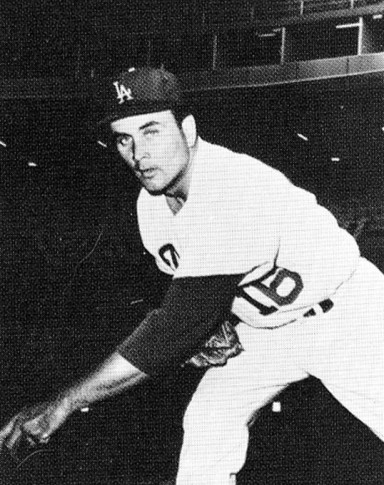
Dodger pitcher Ron Perranoski, 1961-1967; 1972; Dodger pitching coach 1981-1994.
The Dodgers threatened in the 14th inning, but failed to score. Perranoski retired the first eight hitters he faced before allowing a single in the 14th inning and the game remained tied at 5-5. In the 15th inning, Johnson hit a two run home run to put the Dodgers ahead and they added an insurance run for an 8-5 lead to the bottom of the 15th inning. Perranoski blanked the Giants for the last three outs and the Dodgers came away with a 15-inning, 4 hour, 11 minute nailbiter. The Dodgers had 20 hits in the 15-inning game.
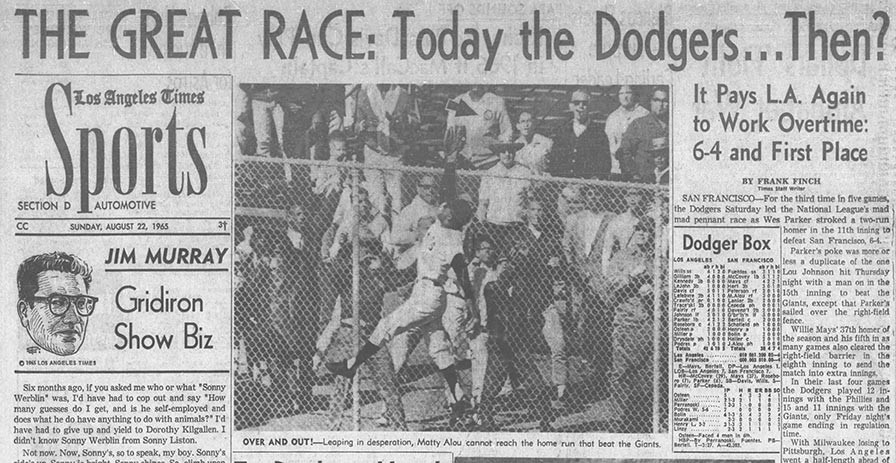
The next night, Bob Shaw throttled the Dodgers easily, 5-1. Willie Mays and Jim Ray Hart hit home runs to power the Giants to the win. Saturday’s game was another barnburner. The Dodgers led, 2-0 in the sixth inning when the Giants scored three runs to take the lead. The Dodgers countered with a dose of their own power as John Roseboro hit a two-run home run for a 4-3 lead. Back came the Giants with a Mays home run in the eighth inning to tie the game at 4-4.
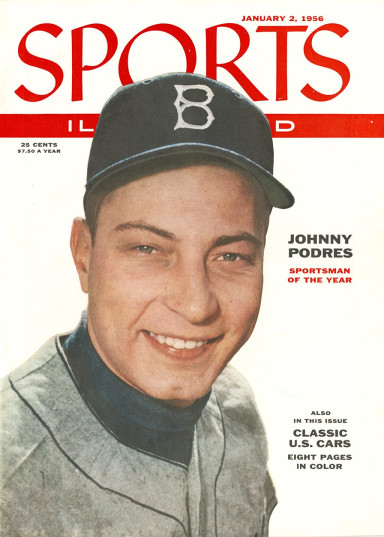
Johnny Podres appears on the January 2, 1956 cover of Sports Illustrated magazine as the “Sportsman of the Year”, only the second time the award had been given in the periodical’s history. Podres was the 1955 MVP in the World Series for winning two games, including the clinching Game 7 shutout over the New York Yankees.
Alston made every move he could to win the game. He batted Drysdale for Ron Perranoski, but when the Dodgers failed to score, he turned to starting pitcher Johnny Podres to begin the 10th inning. Podres had been a Dodger starting pitcher, but with a tired bullpen and Koufax starting the next day, Alston could use Podres. Podres set the Giants down in order in the 10th inning, and in the 11th inning, Dodger power struck the Giants again. Parker hit a two out, two-run home run and Podres set the Giants down in the 11th inning. The Dodgers would earn at least a split of the series and leave San Francisco with a lead.
Sunday, August 22nd had both teams and Candlestick Park fans ready for the Koufax-Marichal matchup. Marichal had already won 19 games for the Giants and Koufax had 21 victories for the Dodgers. The Dodgers scored single runs in the first two innings and led the Giants 2-1 in the bottom of the third inning when Marichal came to the plate.
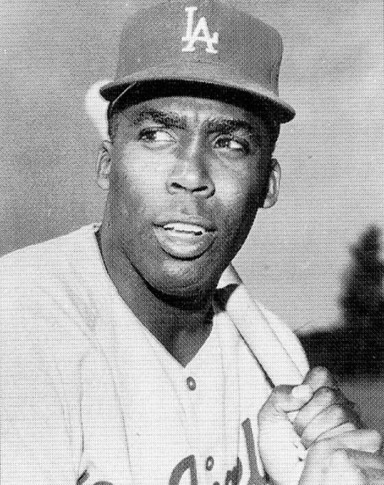
John Roseboro, Dodger catcher 1957-1967
It had been a difficult pennant race for both clubs. Both clubs were fierce rivals. Koufax and Marichal were the top two pitchers in the league. Civil disturbances in Los Angeles and United States soldiers deployed to the Dominican Republic were on the minds of all players. During Marichal’s at bat at home plate, Roseboro and Marichal exchanged harsh words regarding previous incidents in the series that upset both players. A melee erupted. When the umpires restored order 15 minutes later, Marichal was ejected from the game, and Roseboro left the game with a two-inch cut at his scalp. Superstar outfielder Willie Mays was one of the main peacekeepers to get the players settled down and it was also Mays who then hit a three-run home run off Koufax for the difference in the game. The four game donnybrook left the Giants and Dodgers with a split and the Dodgers left town with a 1/2 game lead, but the pennant race had taken a very serious turn, and it was still only August.
Despite the hard feelings of that weekend, Marichal and Roseboro both realized over time the need to move on from that moment. After each player retired, they knew they had been very competitive players in a heated pennant race. And they also knew the importance of showing the baseball world even the harshest emotions can be healed.
Roseboro explained, “There were no hard feelings on my part and I thought if that was made public, people would believe that this was really over with. So I saw him (Marichal) at a Dodger old-timers’ game and we posed for pictures together and I actually visited him in the Dominican.” Richard Goldstein, New York Times, August 20, 2002 Marichal was in accordance with Roseboro regarding their relationship. “Our friendship is very good,” said Marichal in 1990, the 25th anniversary of the event. Richard Goldstein, New York Times, August 20, 2002
Leaving San Francisco, the Dodgers traveled to play the New York Mets. The Mets entered the National League in 1962 and the early years were rough going. The 1965 season had them on their way to losing 112 games and it was felt that the Dodgers would do well in the four game series. In the first game of the series, the Dodgers won 8-4 in a ragged game that saw both clubs make four errors and Drysdale allowed 11 hits in seven innings. Still, the Dodgers looked forward to the remainder of the series with Osteen and Koufax in the final two games.
There is an axiom in baseball that while you may be playing a bad major league club, it is still a major league club and a major league club is always capable of defeating their opponent. The Dodgers led the Mets 3-1 in the second game of their series on August 24th, but a ninth inning error followed by three straight Met hits gave them a come from behind 4-3 win. The next night, the Mets scored five runs in the first two innings off Claude Osteen for a 7-5 win. In the final game of the series, the Dodgers may have had Koufax on the mound, but the Mets had Tug McGraw starting. The future great relief pitcher held the Dodgers to two runs in 7 2/3 innings and the Mets put enough hits together to beat Koufax. A New York political cartoonist characterized the Dodger frustration as he showed a person in a Dodger uniform and the laughter of New York City seen in the background. Four teams were now within 1 1/2 games of each as the Dodgers were in first, the Reds and Braves trailed by 1/2 game and the Giants were just 1 1/2 games behind. The Pirates were a fifth team that had a real interest in the race and they were just 4 1/2 games behind.
Leaving New York behind, the Dodgers traveled to Philadelphia for better things, but the Phillies rocked Drysdale for four runs in the first inning. The Dodgers scored in four consecutive innings to take the lead, and would start the ninth inning leading 9-6. Relief pitcher Howie Reed got the first two outs in the ninth inning, and struck out Dick Stuart, but the third strike eluded Roseboro. Reed allowed two more hits for two runs, but left the tying run on second base and earned a save in the wild 9-8 win.
The next night, the Dodgers dreaded facing the Phillies’ Chris Short. Short had already beaten the Dodgers three times in 1965 and had won seven straight games against the Dodgers. And so what did the light hitting Dodgers do? They scored seven runs in the first inning and drove Short from the game after he retired just one hitter. John Purdin started the game and was the beneficiary of the big lead, but when the Phillies got to within 7-4 in the fourth inning, Alston relieved Purdin with Jim Brewer. Brewer pitched an excellent game as he pitched five shutout innings with seven strike outs for the win. Brewer did not pitch the ninth inning. That was left to the lefthander Koufax and Sandy pitched a scoreless inning for a save. It was Koufax’s first save of the season and his eighth career save. Nothing made sense any more in this pennant race.
September
August ended and September started on a sour note for the Dodgers. They were rained out on August 31st in Pittsburgh and were required to play a doubleheader on September 1st with their already overworked pitching staff. Koufax started the first game against the Pirates and had an early 2-0 lead until the Pirates tied the game in the sixth. The Dodgers had just three hits in the final six innings and Alston stayed with Koufax for the entire game. He struck out 10, but catcher Jim Pagliaroni drove home Wilver Stargell with two outs in the 11th inning for the winning run. A tough night got even worse when the Pirates won the second game, 2-1 as they scored the tie breaking run off Drysdale in the eighth inning. As the long day ended, the double loss to the Pirates left the Dodgers one percentage point behind the Cincinnati Reds (.561 to .560) and the Dodgers one game down in the loss column. The Giants were just a 1/2 game behind, the Braves were two games behind, and the Pirates were 2 1/2 games behind. Five teams were within 2 1/2 games of first place! Even the Phillies, hard luck second place finishers in 1964, were still in the race, just 5 1/2 games behind the Reds. It seemed as if every team in the National League was still in the race.
The Dodgers salvaged the final game with the Pirates and traveled to Houston, the final stop in this never ending road trip. With the need for help from an extra starter, Alston turned to a young left hand pitcher, Nick Willhite. Willhite with relief help from Reed and Perranoski shut out Houston, 3-0. The next night, it took four Dodger pitchers to whitewash the Astros, 5-0. Brewer started and threw three scoreless innings, Podres blanked the Astros four innings, Drysdale retired two hitters with the bases loaded in the eighth inning including a strikeout of Jim Wynn with the bases loaded, and Perranoski finished the game. On Sunday, the final game of the series, the Dodgers had Koufax starting and looking for the sweep. The Astros had been shut out for 25 consecutive innings and Koufax had a 1-0 lead in the seventh. But, Astro pitcher Robin Roberts singled home a tie breaking run in the seventh, and the Dodgers went into the ninth inning, trailing, 2-1 and they needed hits and runs. Wills and Parker singled to open the inning and both moved up a base on an error and the Dodgers had runners on second and third and none out. The next two hitters could not get the ball out of the infield, leaving the Dodgers’ final out to Gilliam. The player-coach delivered an important triple to right field and later scored an additional run in the inning for the Dodgers’ 4-2 win. As the Dodgers finished their four series road trip, they led the Reds by one game, two games over the Giants, and three games over the Braves.
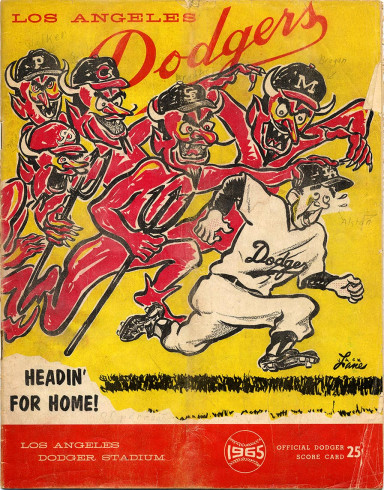
September, 1965. The cover of the Dodger scorecard in September, 1965 has a Dodger being chased by pennant rivals the Milwaukee Braves, the San Francisco Giants, the Cincinnati Reds, the Philadelphia Phillies, and the Pittsburgh Pirates.
The Dodgers returned home to face the Giants in a two game series on September 6th. The cover of the Dodger scorecard for that month had a cartoon of a Dodger player being chased by demons wearing a Giant, Pirate, Red, and Brave cap.
On Labor Day, more than 53,000 in the stadium saw the Dodgers race to a 4-0 lead, but the powerful Giants scored three runs in the eighth inning and Tom Haller hit a solo home run in the ninth inning to tie the game. In the 12th inning, the Giants scored a run with two outs and stopped the Dodgers in the bottom of the inning for an exhausting 7-6 win. The next night, the Dodgers had just three hits in the final five innings as the Giants swept the series, 3-1. The Giants left Los Angeles with a two game sweep and a miniscule lead of .002 percentage points as the Dodgers while having two more wins than the Giants also had two more losses. The Reds were ever present, trailing by just a 1/2 game, and the Braves were just one game behind the Giants.

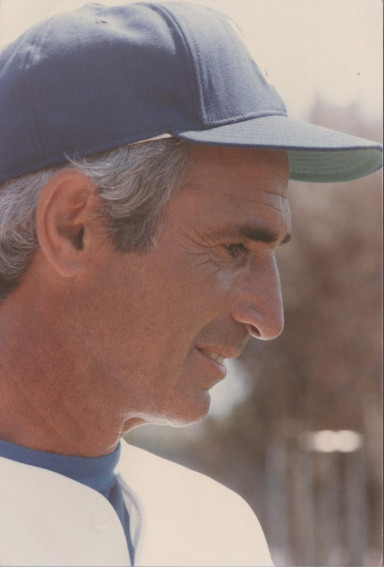
Sandy Koufax is one of the greatest pitchers in baseball history. After struggling with a 36-40 record in his first six seasons, he dominated the National League from 1961 to 1966. Three times he won the Cy Young Award when it was awarded to just one pitcher (1963, 1965, 1966). He pitched for four Dodger World Championship teams tying him with Johnny Podres and Jim Gilliam as the only Dodgers to play for that many World Champions. Koufax is the first pitcher in baseball history to throw four no-hit, no-run games and he capped his fourth no-hitter with a perfect game against the Chicago Cubs on September 9, 1965 at Dodger Stadium. Koufax pitched the clinching game for the National League pennant in 1965 and in 1966 for the Dodgers. He was elected the 1963 National League Most Valuable Player and finished second in the voting in 1965 and 1966. He was elected to Baseball’s Hall of Fame in 1972 at the age of 36, the youngest person ever.
September 9, 1965 was already an unusual day. The Cubs were in Los Angeles to play a one game series. Why just a one-game series? The 1965 season played a balanced schedule, meaning every club played each other 18 games, nine games at home and nine games on the road. The Dodgers and Cubs had already played a four game series in Los Angeles in May and in July for a total of eight games with one game left to be played in Los Angeles by the Dodgers and Cubs. So, they played a one game series at Dodger Stadium.
Koufax started for the Dodgers and Bob Hendley threw for the Cubs. Hendley had gotten off to a terrible start in 1965 and even spent time at Triple A, but he had been making progress.
The Dodgers ran on the field and Koufax walked to the mound to face the Cubs’ leadoff man and center fielder Don Young. Young and left fielder Byron Browne were playing their first major league game and it was Young who made the first out of the game by hitting a pop fly to Lefebvre at second base.
After the Dodger first inning was three and out, the Cubs’ second inning had a foul out by Santo, a strikeout by Banks and the first major league at bat for left fielder Byron Browne. The rookie Browne wanted to be aggressive in his first major league at bat and he hit a hard line drive, but it was right at center fielder Willie Davis. Twenty feet either way might have been a hit for the young Browne, but it was just a hard line drive out.
The Dodgers and the Cubs were two of the lowest scoring clubs in the National League and it was no surprise the first six men were retired in the two innings to start the game. Dodger broadcaster Vin Scully was matter of fact after Lefebvre flied deep to center field to end the second inning as he said “After two innings of play, no score.” Vin Scully, Los Angeles Dodger broadcast, September 9, 1965
In the third inning, broadcaster Jerry Doggett took over for Scully and as the leadoff hitter for the Cubs, Chris Krug, batted, Doggett mentioned, “No score, no runs, and no hits for either side.” Jerry Doggett, Los Angeles Dodger broadcast, September 9, 1965
The Cubs went down in order again and in the Dodger third inning, Parker grounded to shortstop, Torborg grounded to third, and Koufax grounded to the pitcher Hundley.
Broadcaster Scully began play by play in the fourth inning and said, “No runs and no hits for each side as we go to the fourth (inning). “So two talented lefthanders locked up, Bob Hendley and Sandy Koufax.” As Scully did the play-by-play, he kept listeners informed of the Mets-Reds’ game in Cincinnati, as the Reds were tied with the Dodgers for second place. Scully also gave pitching updates for the Dodger-Astro series that weekend and discussed the birth of a son for shortstop Maury Wills. Vin Scully, Los Angeles Dodger broadcast, September 9, 1965
Koufax retired the first two Cub hitters in the fourth inning and then fanned star Cub outfielder Billy Williams. As the fourth inning ended, Scully added, “We have a perfect game on both sides. Koufax has retired 12 in a row, Hendley has retired nine in a row and so there just hasn’t been a visitor to first base.” Vin Scully, Los Angeles Dodger broadcast, September 9, 1965
Hendley responded to Koufax’s performance and retired the Dodgers in the fourth. Scully noted the scoreless duel, “Hendley has retired 12 in a row and after four innings, perfect. Nobody has gotten nowhere with nobody.” In the next inning, Scully told school students to excuse his use of his triple negative. Vin Scully, Los Angeles Dodger broadcast, September 9, 1965
The Cubs’ fifth inning was three up and three down. As Koufax left the field, Scully noted “Boy, we really got something going here tonight at Dodger Stadium. Koufax has retired 15 in a row and Hendley has retired 12. At the end of 4 1/2 innings...nothing!” Vin Scully, Los Angeles Dodger broadcast, September 9, 1965
Scully was now setting the tone for the listening audience. As the Dodgers batted in the fifth inning, he said, “No score. No hits. Nothing but outs. Bob Hendley locked up in a perfect duel with Sandy Koufax.” Vin Scully, Los Angeles Dodger broadcast, September 9, 1965
Lou Johnson led off the Dodger fifth inning. Hendley pitched him carefully, but walked him on a 3-2 pitch. “That’s the first base runner of the night,” said Scully. “Some of the Cubs are hollering at Ed Vargo (home plate umpire) and Vargo motions the pitch was high above his (Johnson’s) shoulder. ..That would mar the perfect game for Hendley, but his no-hitter was still alive.” Vin Scully, Los Angeles Dodger broadcast, September 9, 1965
Fairly then sacrificed Johnson to second to put a Dodger into scoring position. As Hendley was pitching to Lefebvre, Johnson took off for third base. Cub catcher Krug’s throw to third was high and went into left field and Johnson kept running all the way to home plate for the first run. The Dodgers led 1-0, but without a base hit!
Hendley retired the next two hitters and Scully noted the irony that “In five innings, no hits for either side, but the Dodgers lead 1-0 at the end of five.” Vin Scully, Los Angeles Dodger broadcast, September 9, 1965
As the game moved to the sixth inning, Scully was up front with the broadcast listeners. “1-0 in favor of the Dodgers,” said Scully. “Koufax has retired 15 in a row. For five innings, Koufax and Hendley have pitched no-hitters.” Vin Scully, Los Angeles Dodger broadcast, September 9, 1965
The Cubs came very close to getting their first base runner in the sixth inning. Catcher Chris Krug led off the inning with a ground ball to shortstop Wills and Wills’ throw to first was a challenge for first baseman Wes Parker. The throw from Wills to Parker dipped dramatically, but Parker, a future Gold Glove winner, handled the play. Don Kessinger was the next hitter and third baseman Jim Gilliam played on the grass at third base to take away a bunt attempt. It was fortunate for Gilliam and Koufax he did so as Kessinger, a fast base runner, topped the ball to third base. If Gilliam had not been playing close, it would have been a very tough play, but Gilliam’s great infield instincts helped him get the throw to first base to throw out Kessinger on a close play.
The crowd started to sense some excitement of this special night. Scully added, “There’s much more to the story than just the score. Hendley has a no-hitter for five and Koufax has a perfect game for 5 2/3.” Vin Scully, Los Angeles Dodger broadcast, September 9, 1965
Koufax fanned Hendley for the final out of the sixth inning to retire the 18th straight Cub and Scully said, “Welllllllllll, now pass the word. For six innings, Koufax has pitched a perfect game. “For five innings, Hendley has pitched a no-hitter.” Vin Scully, Los Angeles Dodger broadcast, September 9, 1965
Hendley set the Dodgers down in order in the sixth inning. “I’ll tell you,” said Scully, “you just won’t see a better game as far as major league pitching goes.” Vin Scully, Los Angeles Dodger broadcast, September 9, 1965
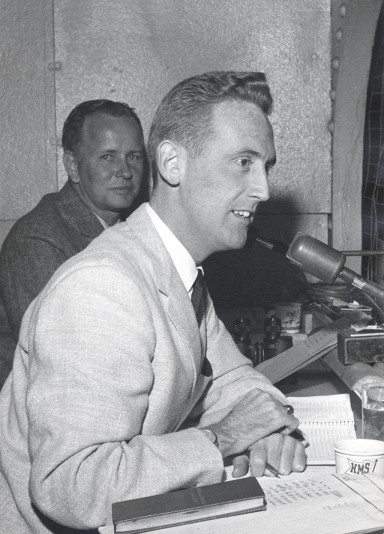
Vin Scully, foreground, is at the microphone next to broadcasting partner Jerry Doggett, as they announce the last game played at Ebbets Field in Brooklyn on September 24, 1957.
The Cubs returned to the top of the order in the seventh inning. As Koufax pitched to Don Young, he sailed a fastball far above everyone to the backstop, but he fanned Young. The next hitter, Glenn Beckert, hit an easy fly ball to right field. But, Koufax fell behind 3-0 to the great Cub outfielder, Billy Williams and the crowd moaned in anticipation. One ball away from losing his perfect game, Koufax battled back. He got a called strike, Williams fouled off a second strike, and then Williams flied out to Lou Johnson. 21 hitters up, 21 Cub hitters down. Broadcaster Jerry Doggett laughed nervously and said, “This is turning out to be quite a thriller.” Jerry Doggett, Los Angeles Dodger broadcast, September 9, 1965
In the Dodger seventh, Hendley retired the first two hitters. Cub third baseman Ron Santo made a leaping grab of a grounder hit by Gilliam to save a hit and first baseman Ernie Banks made a good fielding play on a ground ball hit by Willie Davis. Davis slid into first base but Banks tagged him before he reached first.
The crowd was buzzing at the double no-hitter. But, Hendley’s good fortune ended as Lou Johnson came up. It had been Johnson who had drawn the walk, sacrificed to second, stole third, and then scored on a throwing error. The sparkplug outfielder would spoil Hendley’s no-hitter as he hit as Doggett described it “a little blooper” Jerry Doggett, Los Angeles Dodger broadcast, September 9, 1965 and it fell into right field and Johnson legged it for a double. Fairly grounded out, stranding the runner in scoring position and the Dodgers finished the seventh inning, still leading, 1-0.
Koufax started the eighth inning facing the heart of the Cub lineup, Ron Santo hitting fourth, Ernie Banks hitting fifth and the rookie Byron Browne. Dodger Manager Walter Alston made a defensive change by inserting John Kennedy to play third base and Scully discussed the difficulty facing Kennedy. “John Kennedy is now at third base and I would think John Kennedy has as many butterflies as Sandy Koufax as you are put in the game as a defensive specialist and the pitcher has a seven inning perfect game, well you know there is some pressure on you.” Vin Scully, Los Angeles Dodger broadcast, September 9, 1965
The tension increased exponentially in the eighth inning and it was felt in the crowd reaction as Koufax struck out the leadoff hitter, Ron Santo. Scully’s voice rose a touch higher as Koufax struck out Banks on a curve for his 10th strikeout. It seemed as if Koufax was throwing nothing but strikes. He had retired 23 straight hitters.
“Ohhhhhhhhh doctor, this is all we needed for the National League pennant race,” Vin Scully, Los Angeles Dodger broadcast, September 9, 1965 sighed Scully as Koufax reached a second strike on Browne. Browne struck out and the out was followed by a huge roar from the fans in Dodger Stadium. Scully’s voice went up a full level as he made the strikeout call. The ovation from the fans was sustained and vigorous. “Sandy Koufax gets a standing ovation! He has struck out 11! He has retired 24 consecutive batters! In other words, he has pitched an eight inning perfect game. He’s got three more outs to go!” Vin Scully, Los Angeles Dodger broadcast, September 9, 1965 Then, Scully added at the end, almost nonchalantly, “Dodgers 1, Cubs nothing.” Vin Scully, Los Angeles Dodger broadcast, September 9, 1965
Hendley was still pitching for the Cubs as the Dodgers batted in the eighth inning. It would be a bittersweet moment for Hendley as he had struggled from a poor 1965 season and now his best game of the season, maybe his career was overshadowed by Koufax’s perfection.
As the Dodgers batted in the eighth inning, Scully said, “If you’re listening and you have a neighbor who’s a red hot baseball fan, it might be a good idea to give him a ring just to make sure he’s at the other end of this thing tonight...It’s been an unbelievable night. For six innings, it was one in a million.” Vin Scully, Los Angeles Dodger broadcast, September 9, 1965
Hendley retired Lefebvre and Parker for the first two outs in the eighth inning. Jeff Torborg hit a drive to left field and for a moment it looked as if the young catcher had given Koufax an insurance run, but Browne, the Cub left fielder making his major league debut caught the deep fly with his back pressed up against the Dodger bullpen gate.
As the Dodgers finished the eighth inning and before the commercial break, Scully described Koufax making his way to the pitcher’s mound. “And so through eight innings, the Dodgers 1, the Cubs nothing and Sandy Koufax is slowly walking out to the mound, but not to get corny about it, but walking out to the mound he’s got a meeting with destiny.”
During the commercial break before the ninth inning, broadcaster Scully reads the commercial live. The stadium organ and the public address announcer reporting a defensive change for the Dodgers is heard under the commercial copy. Scully finishes reading the commercial and then begins the greatest extended narrative by any sports broadcaster in history.
29,000 people and a million butterflies
Vin Scully’s radio call of the ninth inning of Sandy Koufax’s 1965 perfect game against the Chicago Cubs is pure baseball literature.
- - - - - - - - - - - -
By Vin Scully
Three times in his sensational career has Sandy Koufax walked out to the mound to pitch a fateful ninth where he turned in a no-hitter. But tonight, September the 9th, nineteen hundred and 65, he made the toughest walk of his career, I’m sure, because through eight innings he has pitched a perfect game. He has struck out 11, he has retired 24 consecutive batters, and the first man he will look at is catcher Chris Krug, big right-hand hitter, flied to second, grounded to short. Dick Tracewski is now at second base and Koufax ready and delivers: curveball for a strike.
0 and 1 the count to Chris Krug. Out on deck to pinch-hit is one of the men we mentioned earlier as a possible, Joey Amalfitano. Here’s the strike 1 pitch to Krug: fastball, swung on and missed, strike 2. And you can almost taste the pressure now. Koufax lifted his cap, ran his fingers through his black hair, then pulled the cap back down, fussing at the bill. Krug must feel it too as he backs out, heaves a sigh, took off his helmet, put it back on and steps back up to the plate.
Tracewski is over to his right to fill up the middle, Kennedy is deep to guard the line. The strike 2 pitch on the way: fastball, outside, ball 1. Krug started to go after it and held up and Torborg held the ball high in the air trying to convince Vargo but Eddie said nossir. One and 2 the count to Chris Krug. It is 9:41 p.m. on September the 9th. The 1-2 pitch on the way: curveball, tapped foul off to the left of the plate.
The Dodgers defensively in this spine-tingling moment: Sandy Koufax and Jeff Torborg. The boys who will try and stop anything hit their way: Wes Parker, Dick Tracewski, Maury Wills and John Kennedy; the outfield of Lou Johnson, Willie Davis and Ron Fairly. And there’s 29,000 people in the ballpark and a million butterflies. Twenty nine thousand, one hundred and thirty-nine paid.
Koufax into his windup and the 1-2 pitch: fastball, fouled back out of play. In the Dodger dugout Al Ferrara gets up and walks down near the runway, and it begins to get tough to be a teammate and sit in the dugout and have to watch. Sandy back of the rubber, now toes it. All the boys in the bullpen straining to get a better look as they look through the wire fence in left field. One and 2 the count to Chris Krug. Koufax, feet together, now to his windup and the 1-2 pitch: fastball outside, ball 2. (Crowd boos.)
A lot of people in the ballpark now are starting to see the pitches with their hearts. The pitch was outside, Torborg tried to pull it over the plate but Vargo, an experienced umpire, wouldn’t go for it. Two and 2 the count to Chris Krug. Sandy reading signs, into his windup, 2-2 pitch: fastball, got him swingin’!
Sandy Koufax has struck out 12. He is two outs away from a perfect game.
Here is Joe Amalfitano to pinch-hit for Don Kessinger. Amalfitano is from Southern California, from San Pedro. He was an original bonus boy with the Giants. Joey’s been around, and as we mentioned earlier, he has helped to beat the Dodgers twice, and on deck is Harvey Kuenn. Kennedy is tight to the bag at third, the fastball, a strike. 0 and 1 with one out in the ninth inning, 1 to nothing, Dodgers. Sandy reading, into his windup and the strike 1 pitch: curveball, tapped foul, 0 and 2. And Amalfitano walks away and shakes himself a little bit, and swings the bat. And Koufax with a new ball, takes a hitch at his belt and walks behind the mound.
I would think that the mound at Dodger Stadium right now is the loneliest place in the world.
Sandy fussing, looks in to get his sign, 0 and 2 to Amalfitano. The strike 2 pitch to Joe: fastball, swung on and missed, strike 3!
He is one out away from the promised land, and Harvey Kuenn is comin’ up.
So Harvey Kuenn is batting for Bob Hendley. The time on the scoreboard is 9:44. The date, September the 9th, 1965, and Koufax working on veteran Harvey Kuenn. Sandy into his windup and the pitch, a fastball for a strike! He has struck out, by the way, five consecutive batters, and that’s gone unnoticed. Sandy ready and the strike 1 pitch: very high, and he lost his hat. He really forced that one. That’s only the second time tonight where I have had the feeling that Sandy threw instead of pitched, trying to get that little extra, and that time he tried so hard his hat fell off -- he took an extremely long stride to the plate -- and Torborg had to go up to get it.
One and 1 to Harvey Kuenn. Now he’s ready: fastball, high, ball 2. You can’t blame a man for pushing just a little bit now. Sandy backs off, mops his forehead, runs his left index finger along his forehead, dries it off on his left pants leg. All the while Kuenn just waiting. Now Sandy looks in. Into his windup and the 2-1 pitch to Kuenn: swung on and missed, strike 2!
It is 9:46 p.m.
Two and 2 to Harvey Kuenn, one strike away. Sandy into his windup, here’s the pitch:
Swung on and missed, a perfect game!
(38 seconds of cheering.)
On the scoreboard in right field it is 9:46 p.m. in the City of the Angels, Los Angeles, California. And a crowd of 29,139 just sitting in to see the only pitcher in baseball history to hurl four no-hit, no-run games. He has done it four straight years, and now he caps it: On his fourth no-hitter he made it a perfect game. And Sandy Koufax, whose name will always remind you of strikeouts, did it with a flourish. He struck out the last six consecutive batters. So when he wrote his name in capital letters in the record books, that "K" stands out even more than the O-U-F-A-X.
- - - - - - - - - - - -
On a night when Koufax had to throw a shutout, he was perfect. Just another day in the 1965 pennant race. On September 10th, the Dodger player with by far the best slugging average on the team tied a team record with his seventh home run. Drysdale hit his 7th home run to get himself and the Dodgers off to a 2-0 lead and Perranoski pitched three scoreless innings for a save of Drysdale’s 19th win. The Astros gave the Dodgers some nervous moments in the ninth inning when they loaded the bases with one out, but Perranoski retired the final two hitters. The next night, Osteen bobbed and dodged and ducked as the Astros had 12 hits off him in 7 2/3 innings, but the Astros left 11 men on base and the Dodgers came away with an 8-3 win. Osteen had been a hard luck pitcher with an 11-13 record as he entered September, but he would pitch as well as Koufax and Drysdale down the stretch and he would later have one of their biggest wins of the season.
And then the Dodgers hit a bump in the road. A very large bump. The Giants were in the process of a 14 game winning streak that had started on September 3rd. Often the Dodgers and Giants were both at home at the same time due to scheduling, and if two teams were playing at similar times, the information from San Francisco had the Giants winning another game. The Giants had tremendous run scoring ability and a prominent pitching staff, and they were putting on their kick for the stretch drive. And, as Giant fans loved to point out, this is what the Giants had done in September, 1962 when they had trailed the Dodgers by four games with seven games left to play. The Giants rallied, tied the Dodgers, and then added insult to injury when they defeated the Dodgers in a three-game playoff, scoring four runs in the ninth inning in the third game. The Dodgers still remembered 1962 and the Giants loved to remind them.
The Dodgers’ Sunday game with the Astros on September 12th looked to be a win for the Dodgers. They led, 2-1 in the eighth inning, but the Astros scored single runs in the eighth and ninth inning to steal one from the Dodgers. The defeat was doubly worse because the Giants swept a doubleheader from the Cubs. September 13th was a travel day for the Dodgers, but it was the Giants who enjoyed it as they defeated the Astros and moved to a 2 1/2 lead over the Dodgers.
The Dodgers began their final road trip of the season and started in Chicago. Only five days after his perfect game and his opponent’s one-hit, one run loss, Koufax and Hendley faced each other again. A low-hit, low run scoring game was predicted, but this time, it was Hendley who bested Koufax. Billy Williams hit a two run home run off Koufax in the sixth inning, and Hendley made it stand up. He allowed just four Dodger hits. The Giants played a night game in Houston and took advantage of the Dodger loss. They trailed 5-2 in the ninth inning, but scored three runs to tie, and two runs in the 10th inning. The turn of events pushed the Dodgers 3 1/2 games behind the unstoppable Giants.
The games of September 15th brought no more relief to the Dodgers. They scored three runs in the first inning and had Drysdale on the mound looking for his 20th win. The game went downhill from there. In the second inning, Chicago Cub great Ernie Banks hit a line drive off Drysdale’s foot and he had to leave the game. The Dodgers had an abysmal game. They made three errors, leading to three unearned runs, hit into four double plays and came up on the short end of an 8-6 loss. In Houston, the Giants were continuing to play as if they would win the National League pennant. This time, they scored a run in the ninth inning to beat the Astros, 3-2. The Giants’ win was their 13th in a row and many reporters compared their 1965 stretch drive to their 1962 pennant. Cold, wet weather was moving into Chicago, but the Dodgers felt it was meant only for them.
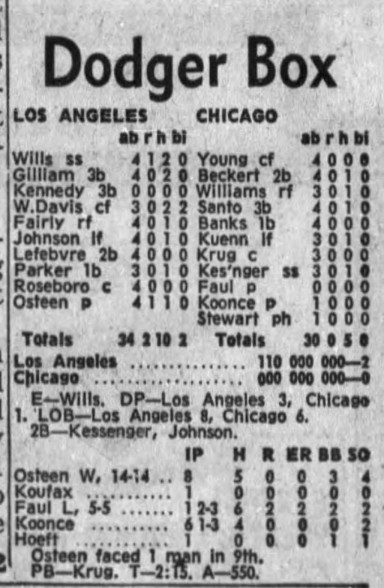
The morning of September 16th was a cold, wet, miserable day in Chicago with the Dodgers at the lowest point of the season for them. The 1965 Chicago Cubs were a team going nowhere and Cubs fans agreed by staying home for the game. However, 550 hardy, resolute fans did pay their way into the ballpark and they are the fans who saw the first game of the Dodger comeback. One sportswriter said, “There were more monkeys in Lincoln Park Zoo than there were cash customers on a grey and gloomy day.” To have hope of completing the game, the Dodgers and Cubs agreed to start the game 30 minutes earlier than the scheduled time. Frank Finch, Los Angeles Times, September 17, 1965 Claude Osteen had lost 13 of his first 24 decisions, but it was due to lack of offense and not pitching skill. In Osteen’s first eight losses, the club had scored just 13 runs. Their backs were against the wall and they needed a well pitched game and they got just that. Osteen’s sinker forced three double plays by the Cubs and Claude made single runs in the first two innings stand up until the ninth. Osteen walked the leadoff hitter, Billy Williams, and Alston decided to bring in his best pitcher for relief.
His best pitcher was Koufax. Sandy had pitched in relief once earlier in the season, but he had thrown six innings just two days before and he had to face the Cubs’ tough righthand hitters, Ernie Banks and Ron Santo. Alston and the Dodgers needed this win and they needed a save from Koufax. Sandy did just that. Santo flied out deep to left field, Banks popped out, and perfect game last out Harvey Kuehn hit a line drive for an out at the second baseman. The Giants paid no attention to the Dodger win. They scored four runs in the first inning on their way to an easy 5-1 win. The Dodgers had not lost any more ground to the Giants, but another game did fall off the schedule.
The next day, the Giants found they could not win them all. Henry Aaron hit two home runs and it was a rout for the Braves as they snapped the Giants’ 14-game winning streak. The streak had them move 6 1/2 games on the Dodgers in that time as they had started two games down and built their lead to 4 1/2 games. The Dodgers would not have an easy time in St. Louis. Drysdale started in his bid for his 20th win and drove in the first two runs with a single. Drysdale led 3-0, but in the sixth inning, he allowed a solo home run to Bill White and a single to Dick Groat. Alston would not wait, even with Drysdale as the starter. Perranoski was the team leader in saves, but no inning was too early now. He allowed an unearned run in the eighth inning, but his four inning stint earned a save and more importantly, had shaved a game off the Giants’ lead. The Giants now led by 3 1/2 games.
The Giants rebounded from their loss to the Braves by winning September 18th in a shutout by two Giant pitchers. The Dodgers’ matched the Giants’ shutout with one of their own by Koufax in a 1-0 win. He had saved a game in relief two days earlier, but went the distance with four hits and six strikeouts. The game was scoreless until the sixth inning when Parker singled home LeJohn. The weather was a steaming 86-degrees in St. Louis after chilly weather in Chicago. The game in St. Louis also helped the Dodgers set a National League record for road attendance. Through this date, the Dodgers had drawn 1,876,982 to break the previous mark set by the Brooklyn Dodgers in 1947. Frank Finch, Los Angeles Times, September 19, 1965
Sunday, September 19th had both the Giants and the Dodgers winning. Osteen pitched eight scoreless innings and Perranoski, no worse for wear from pitching four innings two days previous, saved the game by pitching the ninth inning. Osteen’s sinker was hit on the ground all game by Cardinal hitters. Seventeen of the first 18 Cardinal outs were by the way of ground balls and 22 of his 24 outs he achieved came from the sinker. Lefebvre and Parker hit solo home runs for the Dodger runs. When Lefebvre homered in the second inning for a 1-0 Dodger lead, it was the first Dodger home run in two weeks. Frank Finch, Los Angeles Times, September 20, 1965 The Giants had a harder time winning in Milwaukee. In the eighth inning, the two teams were tied, 2-2. Hal Lanier was on first base for the Giants when Jimmy Davenport topped a ball up the first base line. Brave first baseman Joe Torre picked the ball up thinking it was foul and became enraged when the first base umpire called it a fair ball. Torre threw the ball to the ground in disgust and as it bounced away, Lanier scored the tie-breaking run. The lead was still 3 1/2 games with 12 Dodger games left in the season.
It seemed as if the Giants would never lose again. On a Dodger off day on September 20th, the Giants shutout the Reds, 4-0 and gained a 1/2 game for a four game lead. Any way you did the math, the Dodgers had little or no room for error if they hoped to win the National League pennant and their final 12 games with Milwaukee, St. Louis, Cincinnati and Milwaukee again to finish the season. The Braves and Reds were easily above .500 and the Cardinals were just below .500, but still a competitive team.

The Dodgers were in Milwaukee on September 21st and it was a melancholy time for the Braves. The Braves had started September just two games out of first place and had hopes for a pennant in their final season in Milwaukee. However, a stretch where they lost seven of nine games took them out of the race and the end of the season would take them out of Milwaukee. The Braves would finish their time in Milwaukee by playing two straight against the Dodgers. Drysdale won his 21st game appropriately on September 21st with a complete game and he singled to move runners along to score an insurance run in the eighth inning. Meanwhile, in Cincinnati, the Giants had a 4-1 lead over the Reds, but the Reds scored six times in the sixth inning to win. The Dodgers were still a long way from first place, but they had gained a game on the Giants with 11 games to play and now trailed by three games.
The final game to be played by the Milwaukee Braves in Milwaukee on September 22nd was a turning point for many. It was a total team effort, and it had to be. Even if you were not a Giant or a Dodger fan, you were watching the scoreboard. Juan Marichal was starting for San Francisco in pursuit of his 23rd win. Sandy Koufax started for the Dodgers and also sought his 23rd victory.
Dodger fans knew it was a big game. This game was being televised from Milwaukee. In 1963, KTTV in Los Angeles had televised the three crucial games in St. Louis and the Dodgers had swept that series on their way to the 1963 World Championship. It was almost too much for Dodger fans to take, but the Dodgers would win, 7-6 in 12 innings in a game that would take more than 3 1/2 hours to play.
The game did not lack for drama. Koufax started and he received an early run in the first inning. In the second inning, the roof caved in on Koufax. He allowed three consecutive singles and then light hitting second baseman Frank Bolling hit a grand slam for a 4-1 Brave lead. Matters got worse for the Dodgers in the third inning. Gene Oliver homered off Koufax and stunned Dodger fans at home watched Koufax being relieved trailing 5-1 in the third inning. The Braves added another run on an inside the park home run and took a 6-1 lead. The news about Koufax being routed was mitigated only by knowledge the Reds had taken a comfortable lead over the Giants, but with so few games left, the day appeared to be a wasted opportunity.
The Dodgers came back. Lefebvre hit a two run home run to get within 6-3 in the fourth inning. They tied the game with three runs in the fifth inning on RBI singles by Willie Davis and Lefebvre. Alston made a bold move, and in the bottom of the fifth inning, asked for his closer, Perranoski. Perranoski went to work. He kept the Braves scoreless through the fifth, sixth, seventh, eighth, ninth, and 10th innings. Twice he stranded Brave runners in scoring position.
As the two exhausted teams started the 11th inning, Alston had Drysdale hit for Perranoski and he grounded out. Wills then singled, stole second, and then scored when Johnson singled to center. The Dodgers had a lead and would need three outs to move within two games of the Giants. Bob Miller began the 11th inning in relief and with one out and a runner on first, caught a break. Henry Aaron hit a hard line drive right at Willie Davis. The Brave runner on first went too far when he thought the ball would drop for a hit and Davis’ throw to Parker for a double play ended the game. Dodger fans were completely wrung out but the Dodger players were euphoric. They had won a game most had expected to lose and they moved another game closer to first. And most importantly, they were coming back to Los Angeles to finish the season, two games behind with 10 games to play. Catching the Giants felt very possible.
As the two contending teams for the 1965 National League pennant race returned home for their final 10 games, scoreboard watching became a fine art. Communication levels in 1965 were primitive compared to today’s use of cell phones, cable television, and internet capabilities. Today, by the use of a modem and a computer, you can find the score, outs, men on base, pitcher, pitchers warming up, location of pitch and type of play in any major league game as it occurs in real time. In 1965, information in a pennant race was a different matter entirely.
In 1965, stadiums around the major leagues employed a ticker tape system to provide information regarding their games. The box-like machine had a large, circular reel of ticker tape paper that would clatter as it would print recent information. Ticker tape machines provided the score by innings, home runs, and pitching changes, but little beyond that. It was often left to the imagination of the fan as to what was happening in the game. A pitching change in an inning might mean a threatening rally, or it could just mean a pitching change. Little information would create great tension.
Dodger fans could get their information in two ways. The fastest way for the fans at home listening to the game on radio was to receive updates from Dodger broadcaster Vin Scully. Scully had a ticker tape machine in the radio booth and would give the recent score of the Giants’ game if it did not interfere with the play-by-play. With Scully’s prime focus of the game at hand, more frequent, but less timely updates would be provided by the Dodger Stadium Message Board.
The Dodger Stadium Message Board was the latest in stadium technology, but the information on the board would print just o-n-e l-e-t-t-e-r a-t a t-i-m-e l-i-k-e t-h-i-s and the time it took to print out this information would add to the suspense. Dodger publicity director Red Patterson squeezed more suspense out of this than Alfred Hitchcock.
If you were a fan at Dodger Stadium watching the game, your gaze might turn to the message board for an update to the Giants game. Patterson would start the message this way:
M-E-A-N-W-H-I-L-E, I-N S-A-N F-R-A-N-C-I-S-C-O,
and your attention would become riveted.
Slowly, slowly, it would say 4-T-H I-N-N-I-N-G, as you watch one l-e-t-t-e-r a-t- a- t-i-m-e
B-R-A-V-E-S............(the dots on the board also required one character at a time) and then after a pause the score would be given.
B-R-A-V-E-S..........3
Then, the scoreboard operator would go to the next line and print out
G-I-A-N-T-S........... and the suspense would continue to grow. What’s going on in the game. What is the score? Who is ahead? Is there a rally going on? What are the Giants doing? Is Mays and McCovey up this inning?
Then, there would be one final pause before the score for the Giants was given:
B-R-A-V-E-S.........3
G-I-A-N-T-S.......... and as you held your breath, Patterson would order the Giant score and fans would then roar with approval if it read
B-R-A-V-E-S..........3
G-I-A-N-T-S...........2
For a few moments a Dodger fan would know the Giants were losing and there was a chance of gaining ground. However, the feeling would not last long and in a few minutes you would want another update. The suspense could be wonderful, could be exquisite, could be hard, could be excruciating. And baseball fans loved it.
The Dodgers were trailing the Cardinals in the first game of their final homestand, but knowing the Braves were defeating the Giants eased some of their pain. Bob Gibson of the Cardinals held the Dodgers in check for seven innings, but Lefebvre singled home Willie Davis and Fairly with two outs in the eighth inning for the tying and winning runs. Perranoski, just two days removed from pitching six innings in relief, threw two more scoreless innings. The Giant lead now dropped to one game with nine games to play.
Saturday, September 25th were day games for both teams. The Giants won 7-5 over Milwaukee, but the game was close. Koufax started and shutout the Cardinals, 2-0. He struck out 12. In this game, he set a major league record for most strikeouts in a season when he fanned his 349th hitter, Cardinal third outfielder Mike Shannon, breaking the old mark of 348 set by Bob Feller.

Sunday, September 26th had the two teams in lockstep with the two day games starting at approximately the same time. Juan Marichal started for the Giants in San Francisco against Milwaukee and it was Drysdale for the Dodgers against the Cardinals. Wills scored a first inning run when he singled, stole second, went to third on an error.
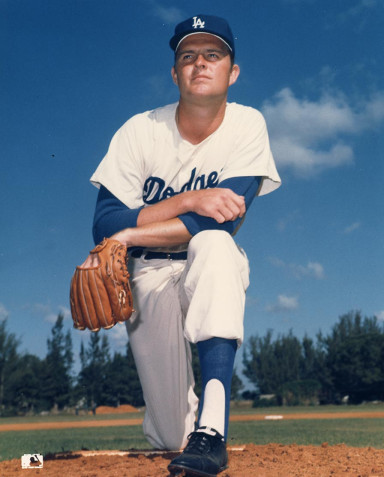
Dodger pitcher Don Drysdale, 1956-1969. Drysdale won 210 games for the Dodgers and was elected to the National Baseball Hall of Fame in 1984 and later became a Dodger broadcaster (1988-1993).
It was enough for Drysdale. He scattered five hits and one Cardinal reached second base. Meanwhile, in San Francisco, a moment of bittersweet irony was happening to the Giants. As the Giants trailed the Braves, 2-0, in the sixth inning, Gene Oliver of the Braves hit a solo home run for a 3-0 lead. It had been Gene Oliver who had homered on the final day of the 1962 season to beat the Dodgers and send them into the heart breaking 1962 playoff with the Giants. Grateful Giant fans invited Oliver to the 1962 World Series with the Giants and the New York Yankees and paid for his traveling expenses and game tickets. Now Oliver had homered again, but this time it hurt the Giants. The Giants would get within one run at 3-2, but their game finished before the Dodgers. As the news of the Giant defeat reached Dodger Stadium, the crowd let out a sudden cheer of approval. When Drysdale retired the Cardinals in the ninth inning, the two teams had identical won-loss records and the pennant would go down to the team with the best record for the final seven days.
Neither team would have a day off the rest of the way. The Giants defeated the Cardinals in San Francisco. The Dodgers defeated the Reds and 22-game winner Sammy Ellis. Perranoski relieved in the game in the sixth inning and shutout the Reds the rest of the way. The closer Perranoski had allowed one run in his last 13 innings and just two runs in his last 30 innings.
September 28th began with two teams tied for first place and when the night was nearly over, one team was in front and one team fell out of first place. The Giants were easily defeated by the Cardinals, 9-1, but the Reds were very tough on the Dodgers. Osteen matched up with Jim O’Toole of the Reds and Osteen nursed a first inning run until the eighth. The Dodgers missed on several good scoring opportunities. The Reds tied the game in the eighth inning and Alston turned to Perranoski. He had pitched four innings the night before and would go as far as he could. The Reds and Dodgers both failed to score through the ninth, 10th, and 11th inning and finally Howie Reed replaced Perranoski. With two outs in the 12th, Pete Rose tripled, but was stranded at third.

In the bottom of the 12th inning, the scoreboard clock was three minutes away from midnight when up came Lou Johnson. Johnson, the journeyman outfielder, traded eight times in his professional career, swung and hit a pitch from the Reds’ Joey Jay into the left field pavilion. It was not quite midnight, but it might have been for the Giants. Johnson sprinted around the bases following his game winning home run, clapping his hands for joy. The Dodgers were all alone in first place with five games to play. Frank Finch wrote in the Los Angeles Times “Lou Johnson, a thoroughbred from the Blue Grass country of Lexington in old Kentucky, showed his class in the stretch.” Frank Finch, Los Angeles Times, September 29, 1965
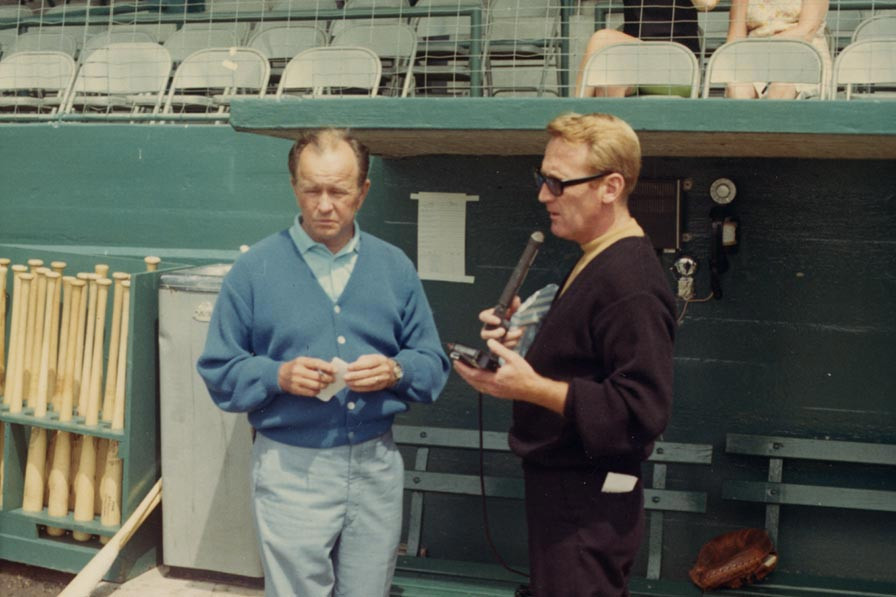
Dodger broadcast team of Vin Scully (right) and Jerry Doggett (left) prepare for a Spring Training radio broadcast in 1968. Scully and Doggett were announcing partners from 1956-1987 and they broadcast the first Dodger home game in Los Angeles on April 18, 1958.
Pennant fever had taken over Los Angeles. On September 29th, Dodger broadcasters Vin Scully and Jerry Doggett did a re-creation of the Cardinal-Giant day game at radio station KFI in Los Angeles, getting information from Candlestick Park and broadcasting as if they were up north. Los Angeles Times, September 29, 1965 Scully and Doggett had their own version of a double-header. After the 12 inning late night win over the Reds, they broadcast the Giant game, then hustled to Dodger Stadium for the twilight game. The Giant game was a wild game, even for this pennant race.
The Giants were facing the Cardinals’ Bob Gibson in a day game on September 29th and Gibson took an 8-0 lead to the ninth inning. The Giants rallied. Five of their first six hitters in the ninth inning hit safely and third baseman Jim Davenport hit a three run home run. After a two base error, a single produced another Giant run. Dodger players, preparing for their twilight game against the Reds, listened to the re-created play-by-play, pitch-by-pitch, and paced nervously. Willie Mays batted for the second time in the inning and singled to put the tying runs on base. Cardinal reliever Hal Woodeschick now faced Giant slugger Willie McCovey. When Woodeschick fanned McCovey for the final out, Dodger players cheered in their clubhouse. The team still had plenty of work to do themselves. The Reds would start Jim Maloney, the pitcher who had shut them out in the 18-0 game in Cincinnati. The Dodgers had Koufax. A capacity crowd filled Dodger Stadium in a twilight start and the start of the game was delayed for 10 minutes. Frank Finch, Los Angeles Times, September 30, 1965 The Dodgers broke a 0-0 tie with a single run in the sixth inning, but it was the seventh inning when they broke the game open.
With the bases loaded and none out, Maury Wills tripled down the right field line and crowd noise in the stadium area broke all previous existing levels. From the rest of the game, it was all Koufax and the Dodger lead was now two games with four games left. After the day’s events, Drysdale was asked if he had any post-season plans. Drysdale replied, “I think I’ll lie down and faint for a few days.” Frank Finch, Los Angeles Times, September 30, 1965
September 30th was a day where the Giants won but also lost. They won a close game over the Reds, but lost a day on the calendar when Drysdale shutout the Braves, 4-0 for the Dodgers’ 13th consecutive win in the streak. Drysdale helped his own cause with an RBI single. “Big D” needed just 89 pitches for the shutout. Frank Finch, Los Angeles Times, October 1, 1965 The Dodgers maintained their two game lead with three games to play.
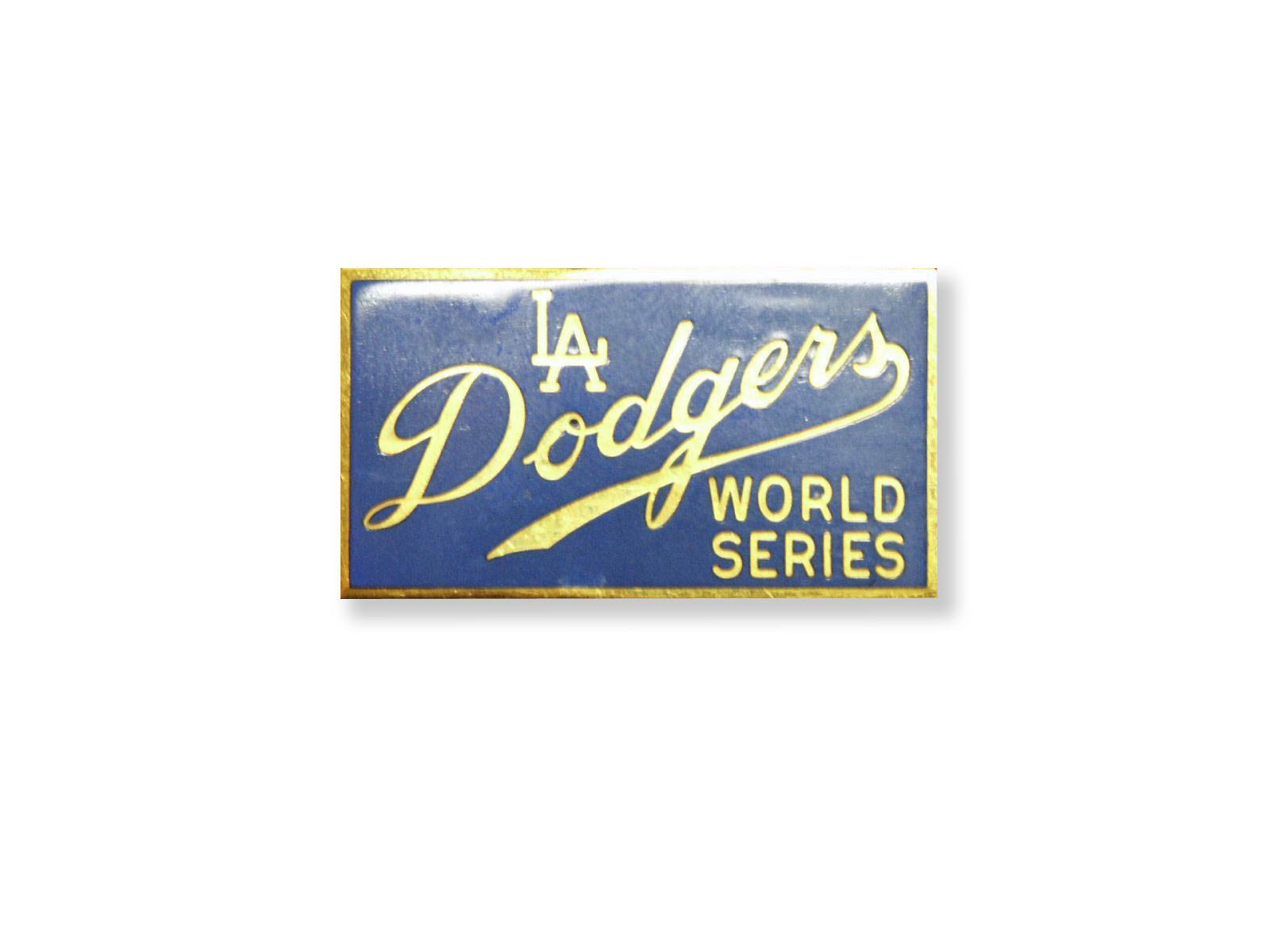
1965 World Series Dodgers - press pin
October
On October 1st, the Dodgers lost when Denny LeMaster shut them out, 2-0, but the Giants were walloped 17-2 by the Reds. The Reds scored four runs in the first inning and added 10 runs in the final three innings. Osteen pitched well for the Dodgers and lost, but the Giant loss now at least clinched a tie for the Dodgers. A two game lead looked large with Koufax and Drysdale scheduled to pitch the final two games.
On the morning of October 2nd, the Dodgers were playing the Braves in Los Angeles and the Giants facing Cincinnati in San Francisco. Three years earlier, the Dodgers needed one win or a Giant loss in the final two days of the season to win the National League pennant and they had lost two straight games while the Giants won two straight. Now, it was three years later and the Dodgers had Koufax on the mound and Drysdale expected to go on Sunday, the final day of the season if necessary. The Braves would not give the Dodgers an easy time. Twenty-four game winner Tony Cloninger of the Braves would be the starting pitcher. In addition, Brave Manager Bobby Bragan wrote Henry Aaron in the second place in the lineup in the Braves’ hope that maybe one more at bat with Aaron as the second hitter would make a difference in the game.
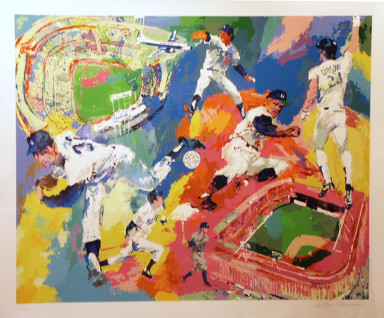
A serigraph of the painting by renowned sports artist LeRoy Neiman to celebrate the 100th Anniversary of the Dodger organization in 1990. The internationally celebrated artist in his impressionistic work Dodger Stadium in Los Angeles, Ebbets Field in Los Angeles in the top and bottom corners. Neiman also stylized Dodger greats from the top as Fernando Valenzuela, Jackie Robinson, Kirk Gibson hitting his 1988 World Series home run, Zack Wheat, Duke Snider and Sandy Koufax.
True to the nature of the entire 1965 season, the Dodgers won the game and did not get many hits. In fact, their first run came without a hit. Gilliam walked, stole second, moved to third on a throwing error, and scored on a wild pitch. Koufax was on his game and struck out five of the first six hitters. He faced a mild jam in the third inning with runners on first and second, but he struck out Felipe Alou and Henry Aaron lined out to third.
Nerves were wound tight in San Francisco and Los Angeles. The Giants and Reds were scoreless through five innings and the Dodgers and Braves were in a close 1-0 game. In the Brave fourth, Gene Oliver, the man who homered in the eighth inning on the final day of the 1962 season to put the Dodgers into a playoff with the Giants, came up, now playing for the Braves. And you couldn’t blame Dodger fans as they shuddered when Oliver hit a solo home run and tied the game at 1-1. With very little hope left, San Francisco fans were hoping the home run by Oliver would be an omen for them.
The game was still tied 1-1 when Johnson led off with a walk. After a single by Lefebvre, Parker hit a groundball and Johnson was trapped off third base when he rounded too far. Caught in a rundown, Sweet Lou scrambled back to third base and beat the tag to the base. Instead of runners on first and second and one out, the Dodgers had bases loaded and none out. Johnson’s avoiding being tagged out rattled Cloninger. Roseboro walked and Johnson scored the go-ahead run. A pitching change was made in the middle of the bat to Koufax, and he walked, forcing in a second run and the Dodgers now led 3-1. However, with a chance to break open the game, the next three hitters went out and the Dodger lead was 3-1 entering the sixth inning.
In San Francisco, the Giants took a 3-0 lead. It would be up to the Dodgers to win the game and the pennant. Koufax took his lead and retired the Braves in the sixth and seventh inning. In seven innings he had struck out 11. The Dodgers’ offense continued to be what it was, a lot with a little. They had scored their three runs on just one hit and Jim Lefebvre’s single in the sixth inning would be the second and last hit of the game for them.
In the eighth inning, for the first time, Koufax shows some fatigue. After retiring the first hitter in the eighth inning, Henry Aaron lined out hard to shortstop and Gene Oliver singled. Koufax bore down and struck out Joe Torre for the final out in the eighth inning.
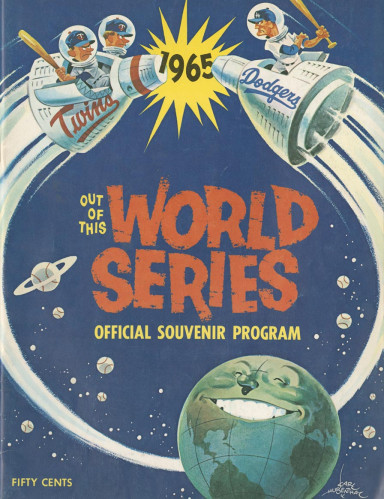
Renowned cartoonist Karl Hubenthal is timely as his 1965 World Series program cover hosted by the Los Angeles Dodgers shows space capsules with the Minnesota Twins and the Dodgers. The NASA Gemini missions (two astronauts aboard) were held six times during 1965 and eventually led to the Apollo missions of taking a man to the moon and back.
Copyright © Los Angeles Dodgers, Inc.
The Giants had finished off the Reds, 3-2 and now waited to see if they could extend the season a day longer by a Dodger loss. The Braves needed two runs to tie but Koufax would start the ninth inning.
The Braves’ leadoff hitter singled. As Koufax struck out Mack Jones, catcher John Roseboro threw out the base runner on a steal attempt for a double play. With one out left to clinch the pennant, Koufax walked Woody Woodward on five pitches. When Koufax’s first pitch to Denis Menke was a ball, Alston made a visit to his pitcher to be sure he had enough left. Frank Finch, Los Angeles Times, October 3, 1965 Brave shortstop Menke ran the count to two balls and two strikes and it was then Menke who hit the final fly out caught by a jubilant Lou Johnson in left field.
“That’s one ball that won’t get into the Hall of Fame,” said Johnson after the game. “I squeezed that baby so hard and so long there’s nothing left of it.” Bob Hunter, The Sporting News, October 16, 1965 The clubhouse celebration was exuberant with Dodger players regarding this as one of their greatest moments. Don Drysdale said, “This is like that commercial which says, ‘It couldn’t be done.” Ibid. Dick Tracewski added, “Maybe we weren’t the best on paper, but we play this game on the field.” Ibid. In Darrtown, Ohio, neighbors of Walter Alston rang their dinner bells loudly to announce Alston’s fifth pennant and Alston himself said, “We wanted to win it ourselves.” Alston took a congratulatory phone call from owner Walter O’Malley and that night, the Dodger president hosted a victory dinner for the players and front office at the Stadium Club as they celebrated the achievements of a remarkable season. Ibid.
The Dodgers had trailed the Giants by 4 1/2 games with 15 games to play. They won 13 straight games and 15 games of their last 16. During the 13 game winning streak, Dodger pitchers threw an amazing seven shutouts, and four other wins limited the opposition to just one run. Nine times the club scored three or fewer runs during the streak and still won the game. Ron Perranoski allowed two earned runs in 36 innings in September and Koufax, Drysdale, and Osteen all recorded ERAs below 2.00. Lou Johnson and Jim Lefebvre led the team in home runs with just 12.
This 1965 Los Angeles Dodgers team didn’t just satisfy itself with the pennant. Facing the Minnesota Twins, an easy pennant winner in the American League, the Dodgers once again did it the hard way, losing the first two games.



They would rebound to win three straight at Dodger Stadium with Osteen, Drysdale and Koufax winning Games 3, 4, and 5.

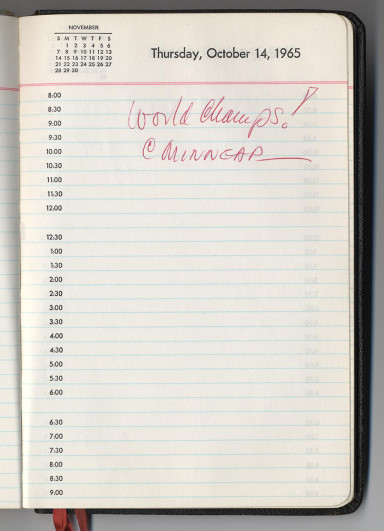
On October 14, 1965, Walter O’Malley makes this joyous note in his 1965 appointment book as the Dodgers defeated the Minnesota Twins, 2-0 in Game 7 of the 1965 World Series to claim their fourth World Championship.
Koufax then came back to pitch Game 7 on two days’ rest to shutout the Twins, 2-0, without a decent curve, and the Dodgers won their third World Series in the last seven seasons.
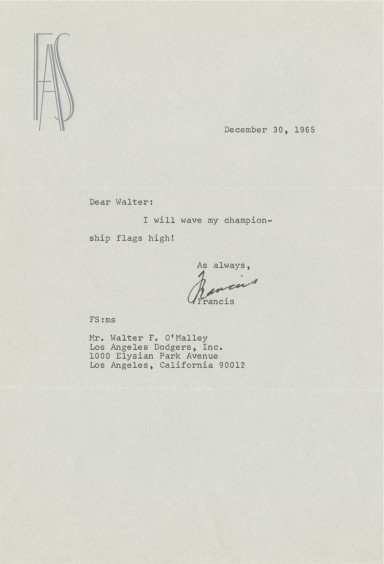
December 30, 1965. Superstar entertainer Frank Sinatra sends Walter O’Malley a letter of thanks for the three Los Angeles Dodger World Champion flags he had received from the Dodger owner after the 1965 World Series. O’Malley had sent the flags to honored Dodger fans and Sinatra, using his stationery that had his initials, “FAS” signed the letter “Francis,” his given name.
But, in order to win the 1965 World Series, the Dodgers had to first get there, and how they got there and what they had to do to get there was to find the way, and they surely did, to win the 1965 National League Pennant race. All these years later, it still remains a tough and memorable pennant race.

